#anime meta
Text
Most anime girls feel like an estimation of what a high school girl is by an alien. Not these ones tho, these cringe ass losers get me
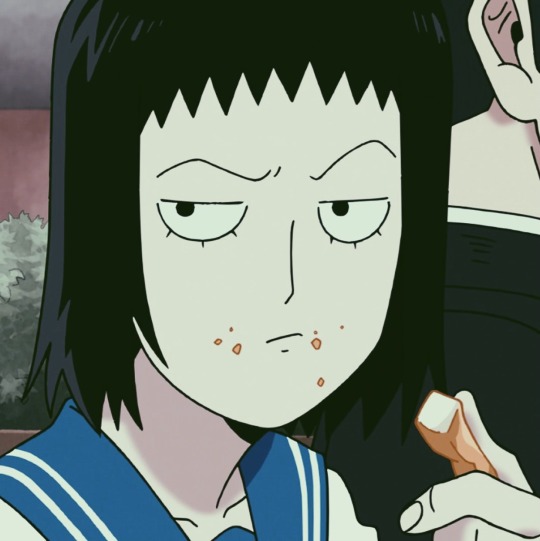

2K notes
·
View notes
Text
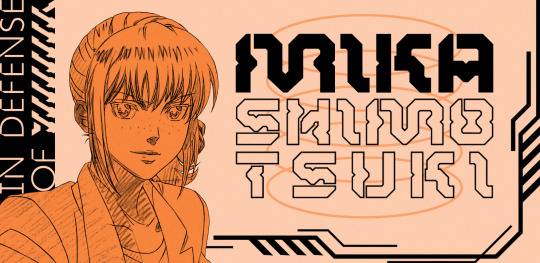
An Essay Exploring Psycho-Pass's Most Controversial Character
I know I’m opening a huge, slimy can of worms and potentially incurring the wrath of half the Psycho-Pass fandom, but I feel compelled to share my feelings on Mika Shimotsuki and how I believe she serves as a lightning rod for fan culture misogyny. Now, before I start, let me just say that this essay isn’t targeted at any one individual, and it’s just my personal opinion, which you are more than welcome to disagree with. I’d also like to stress that, despite my love for Mika’s character, I’m going to try my very best to approach this topic from an academic standpoint rather than an emotional one. I recently picked Parasocial Relationships and their effect on female celebrities and fictional characters as a thesis for my Gender and Media course, and it really got me thinking about this anime in particular, so here we go…
Let’s tackle the female side of things first, because it’s the one that shocks and disappoints me the most. Don’t get me wrong -- I think fandoms with a strong female presence are awesome, complex, uplifting, and oftentimes incredibly positive and inclusive spaces. I love being a female genre fan and interacting with other female genre fans. That said, I’ve noticed female fandom can sometimes fall prey to online bullying and misogynistic groupthink when it comes to (a) female characters they find arrogant, bossy, mean, etc. and (b) female characters who are positioned as potential love interests for their collective male "blorbos," "husbandos," "faves," whatever the term may be. These two things very often overlap, which I’ll touch on later, but for now, let’s talk about the first point.
There was a big movement online several years ago urging creators to “let women be mean. Let them be angry. Let them be petty and complex and difficult. Let them be messy.” I fully support this idea in both theory and practice and wish it were that simple, but unfortunately, it’s not, because uncomfortably large swaths of fandom don’t like/appreciate unapologetically mean female characters the way they do male characters. Men in fiction are allowed to be cutthroat, selfish, cruel, narcissistic, arrogant, and even evil without garnering even a fraction of the judgement that female characters receive for simply being “difficult” or “unlikable.”
Take, for instance, Shougo Makishima. The Psycho-Pass fandom at large adores this character (myself included), despite the fact that he’s a remorseless sociopath who touts the importance of free will as a wholesale excuse for murder. He is a bad person, full-stop, and yet he garners love -- even sympathy -- in abundance. He’s the subject of fawning fan fiction, chibi art, thirst tweets, and endless Reddit analysis. Fans are capable of seeing him, murderous warts and all, as a product of the warped dystopian society Sibyl has created. But Mika? Nope. Just “a bitch, a whiner, an arrogant little girl who deserves to get slapped in the mouth.” (I am not making this up. These are the type of comments I see *female* fans making left and right about her character). She receives far more hate for giving up the location of Akane’s grandmother as a blackmailed, frightened teenager than Makishima does for slashing Yuki’s throat or blowing up Masaoka. Hell, she catches more heat for Akane’s grandmother than Sakuya Togane, the woman’s actual murderer and -- I can’t stress this enough -- a 41-year-old adult man.
Now, I know what some of you are thinking -- Makishima and Togane are villains, so their personality flaws (putting it lightly) and horrible actions are essential to the narrative and indicative of good storytelling. We’re meant to “love to hate them.” All correct, and yet this doesn’t change or excuse the fact that their standing in the fandom, when compared to the equally complex and emotionally fractured Mika, is textbook pernicious misogyny. But, for the sake of argument, let’s compare Mika to another character ostensibly on the side of good -- Nobuchika Ginoza. [Note: Ginoza is my favorite character in Psycho-Pass, and any commentary regarding his PP1 shittiness is made with pure love and appreciation for him and nuanced character growth in general.]
When we first meet Ginoza, he is rude, terse, unyielding, intellectually smug, and totally unforgiving of those closest to him. He’s a brilliant character, and his behavior, no matter how insufferable and seemingly cruel, is the result of compounded trauma -- the trauma of having his father ripped away when he was only nine, the trauma of being unfairly judged for the “sins” of said latent criminal father, the trauma of his mother numbing her pain with medication and eventually becoming something akin to a human corpse, the trauma of finding a new support system and best friend in Kougami only to once again be “abandoned” for the other side of the law. In many ways, he’s still a hurt child lashing out at the world, unwilling to see it for the complicated, morally gray place that it is, because being mad is easier. Telling himself that Enforcers are nothing more than dogs for him to guide and use as shields is easier. Blindly trusting the judgements handed down by Sibyl is easier.
In this way, he and Mika are remarkably similar. When she first joins the MWPSB, she’s a 17-year-old minor whose best friend (and probably first love) was dismembered by a latent criminal under the direction of a serial killer disguising himself as a teacher -- a trusted authority figure. She’s filled with guilt and self-loathing over her failure to act, and the easiest way for her to sort out her feelings and ensure the same thing doesn’t happen again is to harden herself to all latent criminals. Distrusting them, treating them as “other,” is her form of self-preservation. Yes, it makes her come across as mean, as closed-minded, as unlikable, but that’s not a bad thing. It’s good storytelling, and it presents her with plenty of potential for growth, which she is certainly given.
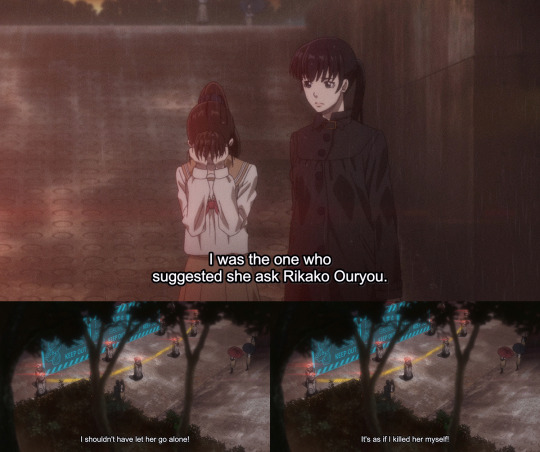
[Upon discovering that her best friend, fellow Oso Academy student Kagami Kawarazaki, has been murdered by Rikako Oryo, Mika breaks down in tears, blaming herself for the tragedy. This is the moment her distrust of latent criminals is solidified.]
But, unlike Ginoza (a 28-year-old adult man), over half the fandom decided that Mika was so awful, so totally unforgivable, such a “heinous cunt,” that they were unwilling to allow her the time and space to grow beyond her trauma and immaturity. But why? Is it because we’ve been taught to judge women, even fictional ones, based on a different set of criteria than men? I think the answer is obvious, and I urge fans who dislike Mika’s character with such intensity to seriously examine their reasoning. I don’t mean to say that she’s infallible (hardly) or that it’s wrong to dislike her. Everyone is entitled to their opinion, and no one person’s take is more valid than another’s, but it’s definitely something to think about in the larger conversation that is media analysis.
Which brings me to Akane Tsunemori, someone who fits all the abovementioned criteria for a “likeable” female character. [Another note: I love Akane, and none of this is meant to disparage her. I am simply trying to point out that she’s a more easily digestible female when viewed through the patriarchal lens of pop culture.] She’s smart but not arrogant about it, strong-willed but never disagreeable, empathetic but not easily led by her emotions, and most importantly, she’s always kind to the fandom’s male faves. She is, in almost every way, trademark "Best Girl" material, and Mika is her foil (at least in PP2). She’s set up to be the anti-Akane, both in personality and narrative function. If Akane trusts someone, Mika doesn’t. If Akane wants to bend the rules, Mika is rigid in upholding them. If Akane isn’t afraid of clouding her Hue, Mika is downright terrified.
Though it’s never stated outright, she probably hoped her senior Inspector would serve as a mentor figure, yet we see none of that from Akane, who often abandons Mika to chase down seemingly wild leads and appears to be stuck in the past, yearning for the original Division 01. (Mika even says as much to Ginoza in a novelization of the first film.) On top of that, I think it’s important to remember that we’re predisposed to side with Akane, as she is both our POV protagonist *and* the hero of the narrative. We have unprecedented access to her private moments, motivations, and methodology. We know she means well and trust that her unconventional strategy will pay off in the end. Mika does not. All she knows is that her direct superior is habitually breaking the rules, overloading her team with what feels like excessive busywork, and ignoring the more bureaucratic side of the job in favor of unconventional/unsanctioned detective work. If I’m being perfectly honest, I would also be submitting concerned reports to my boss.

[When Akane blatantly disregards Sibyl's judgement of bomber Akira Kitazawa, talking him down from a Crime Coefficient of 302 to 299, Mika confronts her for putting both their colleagues and nearby civilians in danger. This later proves to be the right call, as Kitazawa attacks Inspector Risa Aoyanagi and escapes police custody.]

[While investigating Kirito Kamui, Akane keeps her suspicions/theories close to the chest, leaving Mika and the rest of Division 01 in the dark as to her game plan.]
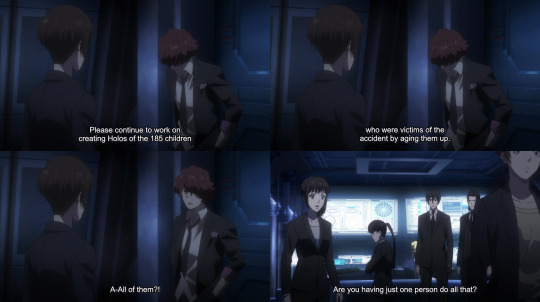
[Although Akane's decision to entrust Hinakawa with all 185 Halos proves to be the right one, it's understandable why Mika is taken aback by her placing so much responsibility on a single subordinate -- especially one with Hinakawa's history.]
Now, that’s not to say Mika’s feelings about Akane are purely altruistic. She’s definitely jealous of her senior Inspector and resents her standing within the Bureau, which makes her behave in ways both petty and vindictive. But I’d argue that this, too, is understandable, if not wholly forgivable, when viewed through Mika’s eyes. Picture this: You’re the youngest-ever recruit to a highly coveted position. You follow protocol to a T, are deferential to your superiors, and show a genuine aptitude for the job. Even your callousness toward the Enforcers (again, your childhood best friend was butchered by a latent criminal) is in accordance with Sybil’s will. Shitty, yes, but standard for someone raised within the Orwellian hellscape of 2100s Japan. And yet, everyone around you prefers your senior Inspector. Your subordinates defer to her when you’re the officer in charge (Hinakawa) and even help her game the system (Ginoza). The Chief tells you you’re boring, but displays obvious favoritism toward her. This severely harms your self-esteem and colors the way you interact with everyone around you. After all, it’s hard to feel like a valued member of the team when you’re being undermined and lectured at every turn. This doesn’t excuse Mika’s behavior, and if she didn’t evolve, I might understand some of the hate, but she does evolve. Spectacularly. She’s just not Akane, and that’s okay.
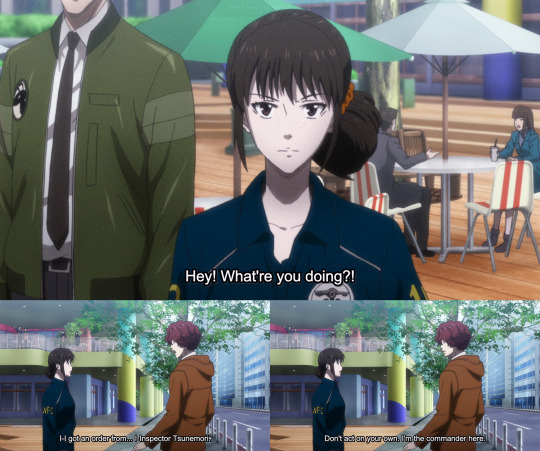
[While dealing with the hostage situation in PP2, Mika notices Hinakawa working on something off to the side. When she confronts him about it, he admits that he's acting on Akane's orders, even though Mika is technically the officer in charge.]
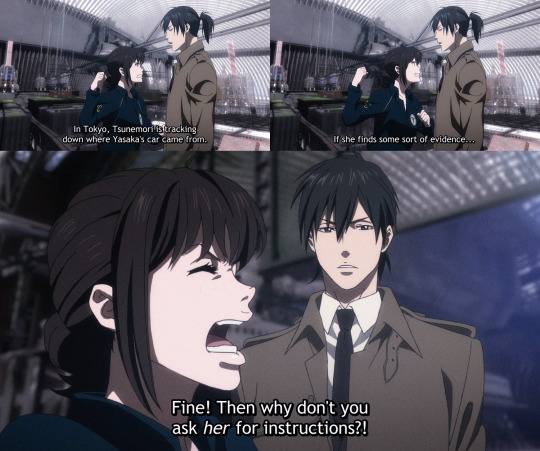
[A similar incident occurs in Sinners of the System: Case. 1, when Ginoza shoots down Mika's (admittedly ridiculous) plan, which she interprets as him once again siding with Akane over her.]
Again, this is good storytelling at work, and you can acknowledge that these two women are diametrically opposed and still appreciate -- hell, even like -- both of them for the well-written characters they are. After all, most Psycho-Pass fans like both Kougami and Ginoza in PP1 despite their many differences, not to mention the fact that Ginoza is (and I say this with love) a giant asshole. Let’s not forget, he was *this close* to microwaving Kougami at Chief Kasei’s behest. You can tell yourself he wouldn’t have, but are you sure? Are you really sure? But we forgive him, because he’s a man. Anyway, back to Akane and Mika. For reasons I’ll never understand, many fans find it borderline impossible to love two women with beef, whether it’s one-sided or mutual. There can only be one Best Girl, and everyone better be on her team. It reminds me of the Sansa vs. Daenerys discourse that gripped the Game of Thrones fandom in its last few seasons. This is doubly ridiculous in Psycho-Pass’s case, because Akane and Mika come to trust, respect, and depend on each other. But people decided to hate this 19-year-old forever, so none of that matters.
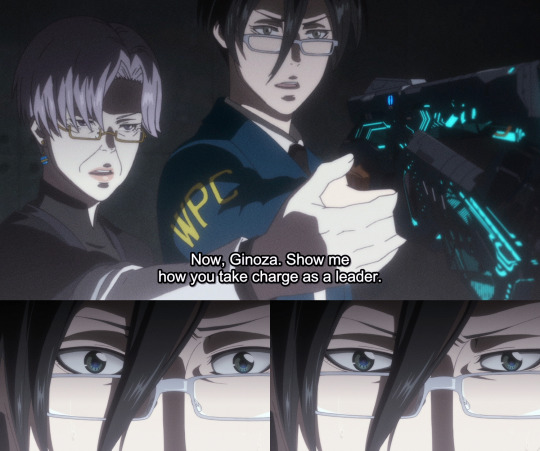
[Notice how Ginoza's gaze narrows ominously in the last frame, suggesting he might actually have pulled the trigger, thereby killing his best friend, had Akane not intervened.]
Now, let’s return to my earlier point about certain fans irrationally hating any female character they deem unworthy of their blorbo, husbando, etc. This is where Parasocial Relationships become extremely interesting. As mentioned above, Ginoza is my favorite character in Psycho-Pass, which I think is pretty common. While I myself have never been one for self-insertion or creating OCs to pair with my favorite characters, I understand that it’s a popular trend, and if you enjoy it, more power to you. It becomes problematic, however, when those who engage in self-shipping/OC-shipping decide to collectively gang up on the female character creators have paired (or hinted at pairing) with the object of their affection. Enter GinoMika. Now, I know what you’re thinking -- “But Mika’s a lesbian!” I don’t necessarily agree. Do I think she was in love with her best friend at Oso Academy? Yes. Do I think she had a crush on Yayoi at the beginning of PP2? Yes. Do I also think it’s obvious she currently has feelings for Ginoza, which have been steadily growing since Sinners of the System? Absolutely. For this reason, I interpret her as being both bisexual and demisexual. But that’s beside the point --
The point is that many Ginoza fans who ship him with themselves, their OCs, or Akane (remember, she’s Best Girl) seem to enjoy trashing on Mika like it’s an Olympic sport. And when I say “trashing,” I don’t mean your normal yet still disappointing level of ship nonsense; I mean unhinged, violent rhetoric that makes me feel like the Internet is a place where women can never win. And why? Because she was mean to him when she first started working for the MWPSB? As if he was oh-so-kind to the Enforcers who worked under him. I seem to recall him screaming at his father and threatening to “make him pay” for visiting his sick wife without permission. Oh, and then there was the time he introduced Akane to her new colleagues by telling her, “Don’t think that the guys you’re about to meet are humans like us.” But yes, Mika once told him that she didn’t want his opinion as a latent criminal, which is so much worse. And before you can say that she’s still a bitch to him, let me point out that she is a textbook tsundere. That’s how she flirts, shows affection, etc. She can never come right out and say what she means, because that would make her vulnerable. But she can surreptitiously tell Ginoza he better come back alive by insisting he return her special Dominator. You know, because it would be a real hassle if she had to replace that thing.
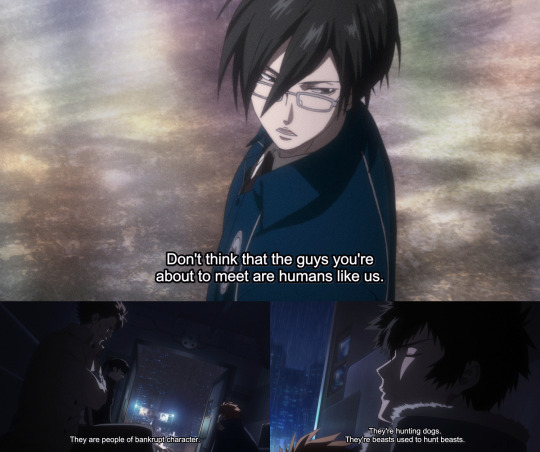
[The language Ginoza uses when introducing Akane to the Enforcers, including his own best friend and father, is deeply dehumanizing.]

[When Aoyanagi takes Masaoka to visit his estranged wife, Ginoza reacts with explosive anger, reprimanding his father in front of their colleagues and threatening to retaliate should he do it again.]
Which brings us, at long last, to the male portion of the fandom. While many female fans like to call Mika out for her more negative character traits, completely ignoring any and all growth she’s experienced since PP2, male fans tend to direct their anger, dislike, etc. in a much more aggressive manner. I wish I was exaggerating when I say that I’ve seen multiple posts praying for Mika’s rape and subsequent murder. You can’t dive into a single “Season 4 Wish List” thread without finding at least one person wishing extreme ill on Mika Shimotsuki. It's pure misogyny, classic “I’ll fuck the bitch right out of her” rhetoric, and it has no place in this fandom or any other. You would never see a male character being talked about in these terms. Consider this: There’s more fan fiction featuring Mika being raped or coerced into sex by her tormentor, Sakuya Togane, than her having a positive, consensual experience with any other character. Love her or hate her, that is extremely fucked up. We as a fandom need to do better, because once this type of misogyny can be weaponized against fictional characters, it becomes much easier to use against real people. Fan culture, though it might seem trivial, says a lot about us and our values.
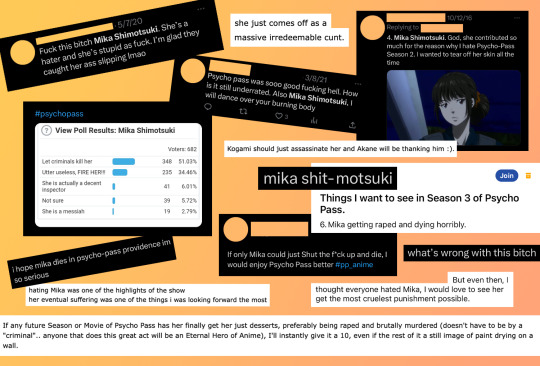
[This is just a sampling of the comments you'll find on Twitter, Tumblr, Reddit, and other social media sites.]
That said, I’d like to end this essay on a more positive note, so let’s take a look at all the ways in which Mika has become a better, more compassionate human being over the course of the series...
By PP3, she shows obvious concern for her Enforcers, values their opinions, and treats them like integral members of her team. In an especially cute scene, she even fist-bumps Tenma Todoroki after they work seamlessly to defeat Koichi Azusawa’s henchmen. She also makes a point to attend the party thrown in the Enforcers’ quarters, as she now longs to be part of the gang -- a gang she would have actively shunned in PP2.
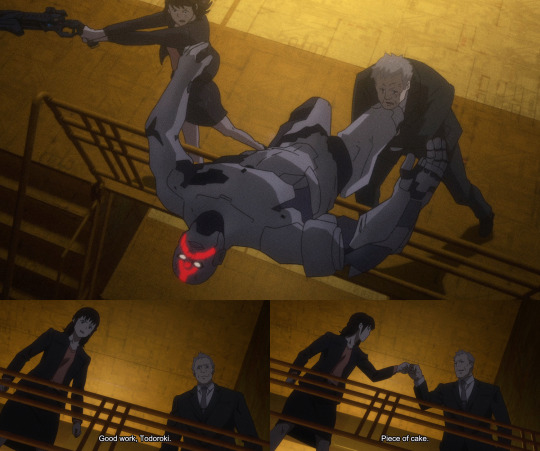
[During First Inspector, Mika shows time and again that she's willing to work with and for her Enforcers.]

[As Chief, Mika realizes that Enforcers deserve respect and gratitude from their superiors. They are no longer dogs to her.]
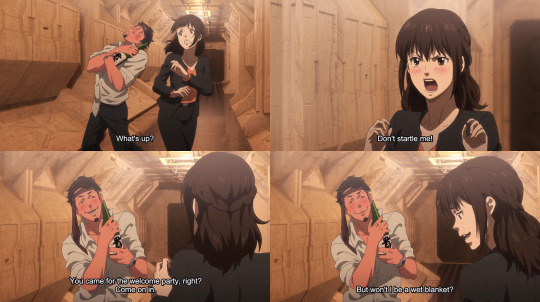
[In PP2, Mika tells Ginoza she doesn't care what the Enforcers think of her. By PP3, however, we see her display concern that her team might find her dull. She wants to be liked and accepted by them.]
She becomes far more flexible with her co-workers, allowing Inspectors Arata Shindo and Kei Mikhail Ignatov plenty of freedom to conduct investigations as they see fit. Yes, she consistently scolds them (textbook tsundere behavior), but this is done in a manner far more humorous than anything else. We know she actually trusts them and has their best interests at heart; she just can’t bring herself to say it aloud. She also repeatedly takes heat from Chief Hosorogi on their behalf and is genuinely worried for Arata when it seems like Sibyl might “eliminate” him. The palpable relief on her face when she finds out he’s allowed to remain an Inspector speaks volumes.
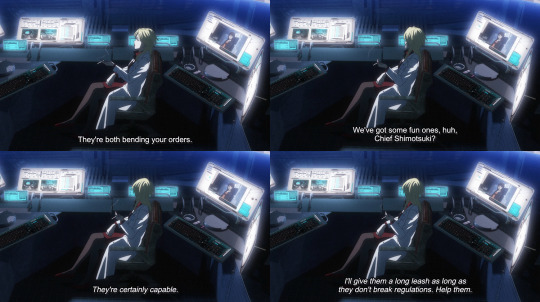
[Throughout PP3, Mika allows Kei and Arata to play to their individual strengths, even if it means bending the rules -- something she would never have done in PP2 or the first film.]
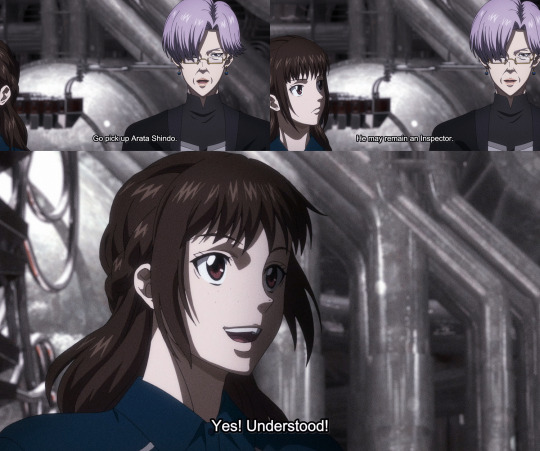
[Just look at that excited face. No caption necessary.]
She goes out of her way to make sure the immigrant prostitutes saved by religious leader Joseph Auma are protected following his death. This is an especially big deal, since many of these individuals are latent criminals, and Mika is forced to ask her newfound nemesis, Frederica Hanashiro, for a favor in order to secure their safety. When she tries to pretend it’s no big deal, Frederica calls her bluff by pointing out that no one would stoop to asking someone they hate for help in order to protect people whose fates they don’t care about.
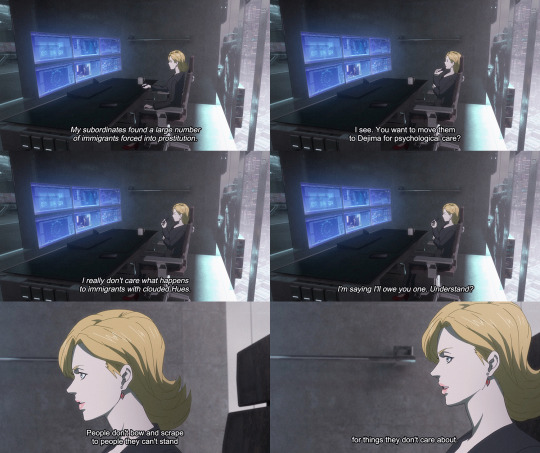
[Even though Mika detests Frederica, she puts the well-being of the immigrants before her own pride.]
In Sinners of the System: Case. 1, her distrust of latent criminals is permanently altered after dealing with Izumi Yasaka, whom she works tirelessly to rescue and comes to view as brave, capable, and worthy of reintegration into society. She also displays genuine concern for and lack of discrimination toward Takeya Kukuri, the young son of a latent criminal, and is horrified to discover that the latent criminal inmates at Sanctuary are being used as disposable tools to move nuclear waste canisters.
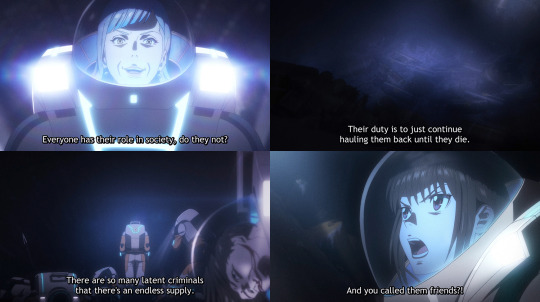
[Sinners of the System: Case. 1 marks a decided shift in the way Mika views latent criminals. Instead of lumping them all together, she begins to see them as individuals who deserve basic human rights.]
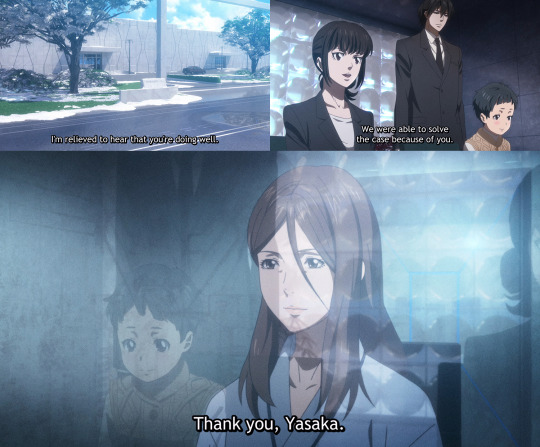
[Even though Mika is unable to save all the latent criminals at Sanctuary, she does everything in her power to ensure Yasaka and Takeya walk away clean.]
When Enforcer Mao Kisaragi turns out to be the “fox within the CID,” Mika and the rest of Division 01 are united in supporting her claim of innocence. Mika trusts (without concrete proof, mind you) that she’s telling the truth about being an unwitting accomplice, something she never would have done in PP2 or even the first film.
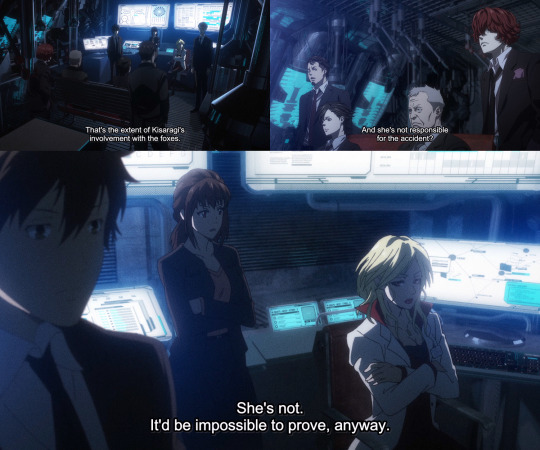
[While the old Mika would have been the first person to distrust Kisaragi, here we see her standing up for the beleaguered Enforcer.]
She comes to respect Division 01 (Akane, Ginoza, Sugo, Hinakawa, Kunizuka, and Shion), views them as a surrogate family, and misses them once their unit is disbanded. In Sinners of the System: Case. 3, Frederica Hanashiro, who temporarily worked as part of their unit, says, “CID Division 01… They’re not just capable; they have a rare teamwork that overcomes the barrier between Inspectors and Enforcers.” Yes, this is mostly due to Akane’s guiding influence, but it’s clear Frederica is talking about the whole team. It’s taken Mika years to get there, but she is now definitely part of the group, not a jealous outsider looking in. In fact, even Mika’s obvious dislike of Frederica in PP3 is a clear result of this affection. After finally finding a place to belong, she feels as though Frederica swooped in and stole her found family, leaving her right back where she started -- on the outside.
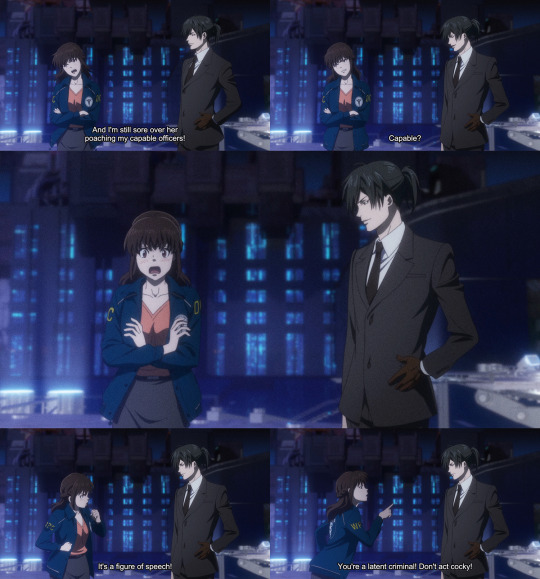
[Though she'll never admit it, Mika views Ginoza as both a mentor and a friend. When he leaves the PSB to join SAD/MOFA, she misses having him around.]
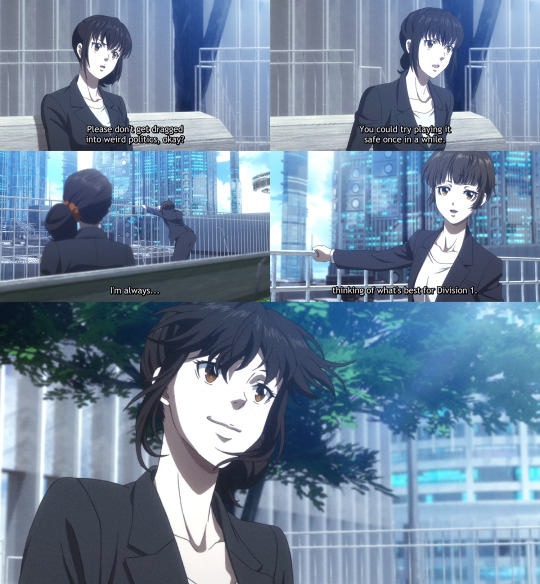
[During her lowest moment in PP2, a jealous Mika actually hopes that Akane's Hue will darken. In Sinners of the System: Case. 2, she pleads with her to take her own safety more seriously. It's clear a big change has occurred in the intervening years.]
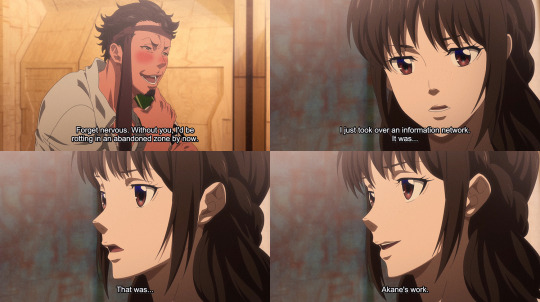
[Instead of feeling constant competition with Akane, by PP3, Mika is finally able to give her her due. It's clear they trust and respect each other despite their many differences.]
She’s grown from an immature young woman who couldn’t bring herself to take responsibility for her failures -- most notably her involvement in Akane’s grandmother’s murder -- to a responsible PSB Chief who holds herself accountable for anything that goes wrong with her Inspectors and Enforcers. This is most evident in her reaction to Koichi Azusawa taking control of Nona Tower and subsequently endangering the lives of MWPSB faculty and agents. We first see inklings of this change near the end of PP2, when Kunizuka tells Mika she’ll never forgive the person who gave up Aoi Tsunemori’s location, and Mika responds in kind. It’s clear that she’s not merely parroting a response to save her own skin but is deeply troubled and filled with regret over her own actions.

[In PP2, Mika is constantly blaming others for her mistakes. By First Inspector, she's owning mistakes she didn't even make.]

[Mika trusts her team so much, she's willing to put her job on the line.]
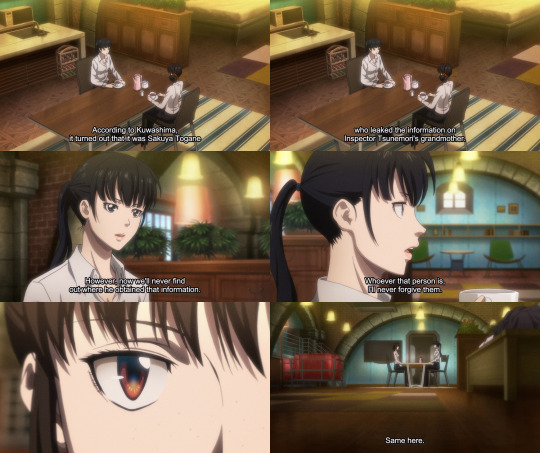
[Although Mika doesn't come clean to Kunizuka about her role in Aoi Tsunemori's death, it's clear she’s haunted by it. Later, when she confesses the truth to Ginoza, he admits to feeling a similar guilt over the way he treated his late father, telling Mika they'll have to bear their respective shame silently for the rest of their lives.]
And lastly, I believe the biggest example of Mika's growth can be found in what is arguably her most important relationship -- the one she shares with Ginoza. Whether you view them as mentor/mentee, begrudging friends, potential love interests, or all three, you can't deny that they have one of the most interesting and entertaining dynamics in the series. As mentioned above, when Mika first meets Ginoza, she views him as a cautionary tale. His demotion from Inspector to Enforcer is her worst nightmare, something that could conceivably happen to her, though she'll never admit it. Because of this, she treats him with hostility, disregarding his opinions and shunning his advice. But the longer they work together, the more we realize that Ginoza brings out the best in Mika -- and vice-versa. His calm, cool demeanor tempers her fiery spirit, and her enthusiasm makes him feel like he still has a purpose. By the time PP3 rolls around, he's become her #1 confidant, the person she calls whenever she has intel to share, grievances to air, etc. And you can't deny that Mika is the one person who makes Ginoza funny. Their flirtatious banter is genuinely charming and shows the softer, more human side of both their characters.
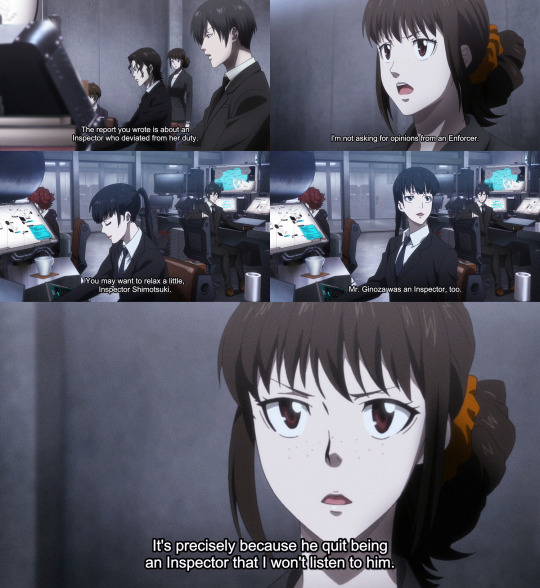
[Given her history with latent criminals, Mika refuses to listen to Ginoza, even when he's coming from a place of experience and genuinely trying to help her.]

[After working together for several years, Mika learns to value Ginoza's opinion and even feels proud when he compliments her.]

[During the Sanctuary case, Ginoza admits to both Akane and himself that being an Enforcer isn't so bad, as long as Mika is the one calling the shots. He knows she has a good heart, and working for her reminds him why he joined the MWPSB in the first place.]
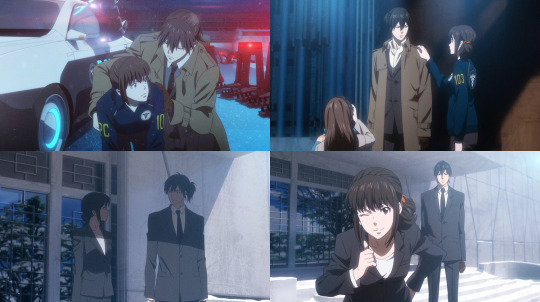
[Notice how Mika's body language changes from PP2 to Sinners of the System. She now looks at Ginoza with appreciation and, in certain instances, affection. The fact that he views her the same way speaks volumes about how far their relationship has come.]
If you made it to the end of this mammoth post, thank you for sticking with me. Hopefully, we can all treat Mika with a little more patience, kindness, and respect when PP4 arrives.
#psycho pass#psycho-pass#pp#shimotsuki mika#tsunemori akane#ginoza nobuchika#ginomika#ginoza x mika#anime#animanga#anime meta#women in anime#women in media#feminism#tsundere#my meta#text post#fandom discourse#did i really write a 4000 word essay defending an anime character?#you fucking bet i did#and i brought receipts
110 notes
·
View notes
Text
Manga with Me: Sad SatoSugu Edition (Because That's Literally the Only Flavor There Is) Pt 2
Because I realized reblogging my initial post to keep the list going was super dumb if I want to keep gratuitously adding to it so... if you've already seen part 2, no you haven't. Especially since I had to add at least one other thing to the mix.
Part 1 | Part 2
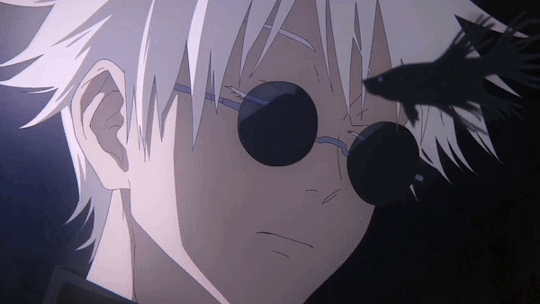
⚠️ Spoiler Warning: JJK 0 movie + season 2 though things may get out of chronological order as I just keep thinking in circles.
Buckle up:
How positively fucked it was that Kenjaku knew the ins and outs of Geto’s thoughts about Gojo upon his possession… and knew how Geto was the one thing that could trip Gojo up… but those idiots were completely unaware.
The fact that they were always cast at odds, cursed technique wise, nature vs nurture, attitude, ideology, etc. But they still found the common ground to respect and care for one another.
I kept saying how Geto only loses his cool when harm comes to Gojo but… the crux of it is the fact that Geto is the only person who loses his cool when harm comes to Gojo because no one else could fathom the possibility (until Yuta and Yuji came along). Gojo’s power damns him to be an infallible weapon just as much as it damns Geto to be a casualty.
In fact, Geto thanked him for his hard work during the Star Plasma Vessel mission. As if Gojo had a choice. But still, Geto expressed appreciation for what most everyone else probably took for granted.
How Geto was the one person who truly challenged and undid Gojo’s godlike power all because Gojo cared for him. *insert River Song’s tirade about the Doctor loving a mere human.*
youtube
The fact that Riko’s death and their subsequent failure is what catapulted Gojo back into the need to refine and perfect his godlike strength which brought him out of touch with Geto. The isolation which Gojo knew all too well is what destroyed Geto.
Not enough emphasis was given to the fact that Geto was actively spiraling, probably couldn’t bring a spoon to his own mouth BUT STILL WANTED TO TREAT GOJO.
Geto didn’t know the power he held over Gojo or, more likely, he never chose to use it because, if Gojo would just follow him, how would that not be just as bad as the position he was already forced into by the elders? Even so, Gojo was frenzied and showed such elevated emotion when Geto defected, when he confronted him. He was undone.
After Geto, we never have the same level of insight or clarity into Gojo either. So, in addition to no longer being vulnerable to threats, he’s no longer vulnerable to us, the readers, either.
This isn’t strictly a SatoSugu observation but.. the fact that Gojo’s strength damned him to face off against a person he cares most about not once… but twice?
Gojo cultivated a life surrounded by people who he protected, who he guided, who were indebted to him, even, and he still felt like Geto was his one and only, even after everything. Even as his dream came into fruition with his team of strong students, it was all for Geto and all for naught without him.
This face when Geto realizes what we’ve known all along. Gojo’s love was unconditional but unfathomable to Geto. Please, I’m sick about it.

During the events of the JJK 0 movie, after 10 years apart, Gojo could still piece together Geto's plan just as well as Geto could figure out that Gojo sent Panda and Toge into battle to trigger Yuta's power up.
When Gojo retorts that “it’s called trust. People with beliefs like yours won’t kill a young sorcerer without reason.” having been figured out by Geto.
Even so, Geto receives that as personally as Gojo probably meant it, surprised to find that "[he] didn't realize [Gojo] still felt any connection with [him]."
When you consider that, even at the close of his life, couldn't be forthright and honest and simply tell Gojo that he never hated him.
Even when Gojo was the source of his most genuine smiles. Even bloody in an alley, death staring him in the face, claiming to not be able to smile with his whole heart and yet
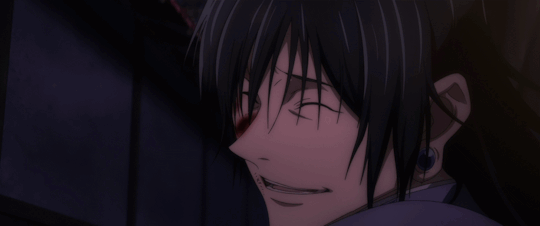
Points aggressively at the board. 👆🏾👆🏾👆🏾
Stay tuned for when I inevitably circle back to light novels, OP's, EP's and literally anything else that pops into my head as this dynamic continues to haunt me. ✨
#manga with me#manga with me jjk#satosugu#we are the strongest#sad anime girl hour#stsg#anime#manga#jjk#jujutsu kaisen#jjk angst#jujutsu kaisen angst#satosugu angst#satosugu brainrot#satosugu meta#jjk meta#gojo satoru#satoru gojo#suguru geto#geto suguru#anime meta#jjk brainrot#jjk gojo#jjk geto#Youtube
49 notes
·
View notes
Text
Unpopular opinion but I actually like that Kazuki and Rei aren't romantically/sexually involved with eachother.
I know a lot of other people would rather it be a bl, but personally I'm genuinely super happy with them being familial and platonic.
Why? Because its still queer. They just aren't gay. This is clearly a queer platonic relationship 🫶🏾💕
#buddy daddies#buddy daddies spoilers#rei suwa#kazuki kurusu#miri sanaka#qpr coded#queer platonic relationship#queer platonic partners#found family#anime meta#qpr#qpp#it can be queer without being gay#they are in a qpr you cannot change my mind#buddy daddies discourse#buddy daddies meta#meta
26 notes
·
View notes
Text
All these mediocre-ass anime getting reboots, sequels, and other works in the same universe but Escaflowne getting none of that. You all sicken me
#escaflowne#vision of escaflowne#90s anime#retro anime#mecha anime#anime meta#classic anime#anime classic
25 notes
·
View notes
Text
Character Analysis: Shouya from A Silent Voice
(Spoilers for A Silent Voice/Koe no Katachi)
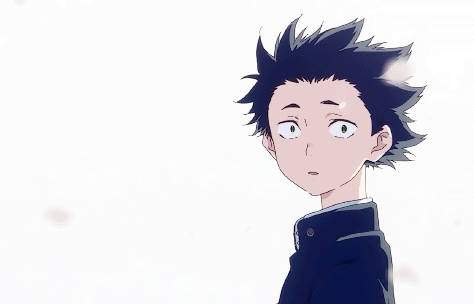
Shouya Ishida is one of my favorite anime/manga characters ever, and I’ve been meaning to make a post about him. In my opinion, he is the poster child for the perfect redemption arc. I want to talk about some of the reasons why his change of heart was foreshadowed/under the surface right at the beginning, and why we as an audience are rooting for him, despite the horrible things he did to Shouko.
A Silent Voice is currently one of the top anime movies of all time, and while I do really love the movie (KyoAni is amazing) I am a much bigger fan of the manga; it has more time to expand on the characters and introduces some smaller important plot lines. In this post I will be quoting some moments that were in the manga and not the anime, aka, Shouya’s internal monologue. Anyway, let’s get into it. I want to start with why I think Shouya went down the bullying path in the first place.
Environment and Role Models
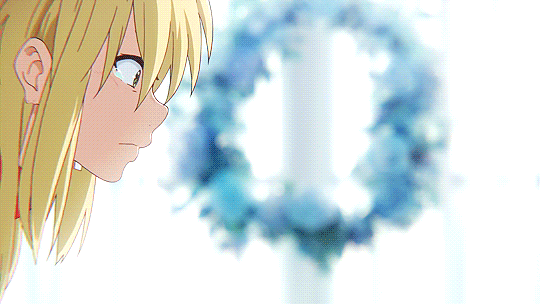
One of the biggest factors that influenced Shouya’s class’s toxic environment and led him to be a bully was having an uncaring ableist teacher. In the manga, the phrases “something we just have to deal with” and “this is your responsibility”, things that the teacher said to him regarding Shouko, repeatedly echo in Shouya’s mind whenever he interacts with her. At some points, the teacher actually laughs when the other students make fun of Shouko, letting Shouya (as well as the others) believe that it’s an ok thing to do. If Shouya had an adult figure in the classroom with a stronger sense of morality, he might have changed his tune earlier.
Shouya was also highly influenced by his peers (which makes sense because he was literally 11 years old). When another teacher comes into the classroom to explain what sign language is, there’s a very small panel before anyone else says anything, where Shouya thinks “that sounds fun”. At first, he’s interested in sign language and may have been willing to give it a shot. But then, Ueno suddenly starts complaining about how it’s much easier for them to use the notebook than sign language, and Shouya absorbs this and immediately goes back to thinking about how much of an inconvenience Shouko is to him.
Another influence on Shouya’s behavior is his home environment. I do not want to shade Shouya’s mom completely because overall I think she is a loving parent, but unfortunately she was not able to fully be there for her son because she is a single mom with a full time job. Even though he was in a caring home, he was not necessarily in one that gave him enough attention, and by the time Miyako realized what her son was up to it was too late. If she had given him more guidance earlier on in his involvement with Shouko, they may have been able to avoid disaster.
But all of these reasons aren’t excuses, they’re explanations. Regardless of why, Shouya contributed to Shouko’s severe trauma and did unforgivable things. So why do I think he’s the best case for redemption in anime?
Recognition/Guilt

Shouya is repeatedly shown as having actual remorse for his past actions. This is why other bully characters like Ueno and Kawai are seen as far less likable than Shouya. Other people on here might have actual analyses about those two characters, but as for this post all I’m going to say is that I believe they are much more widely hated than Shouya because of their initial denial of having done anything wrong.
It’s also important to remember that Shouya changed his tune as soon as Shouko left. It wasn’t years after she left his school that he realized he was wrong, it was days. He as an 11 year old realized he was wrong for hurting her; he figured it out as soon as he noticed how she was protecting him from being bullied. And once he himself started to be harassed by his peers, he finally recognized the full weight of what he had done to her.
Some might criticize this moment, saying “Shouya only realized bullying was bad because he got bullied himself”, but frankly, what’s so wrong about that? Many kids who bully don’t realize the full extent of the emotional damage they’re doing until it happens to them. Through this experience Shouya was able to realize, “this is how much pain she felt from the things I did to her”. And that unfortunate shared experience is what drives him to have so much guilt and a desire to change.
Change of Behavior

After his realization of the severe damage he had done to Shouko, Shouya started actively being more kind and thoughtful to others. He learned sign language in order to properly apologize to Shouko. He started helping out strangers and not judging people who are different (Tomohiro, Yuzuru). He acknowledged the severe financial strain he put on his mother and worked hard to pay her back.
And the whole point of the ending of the story is that him feeling sorry for himself and hating himself for the rest of his life isn’t going to undo his past behavior. All he can do now is operate with a better mindset going forward and make a positive difference instead.
Obviously, no one should be forced to or feel obligated to forgive their bully/abuser. But the story isn’t about whether Shouko should forgive Shouya, it’s about whether Shouya can change into a better person. I think it’s a very harmful ideology to believe that people who were bullies as children will be the same person forever. The world isn’t divided into ‘good people’ and ‘bad people’, it’s made up entirely of people who are capable of doing both good and bad things. And I really like how the protagonist of A Silent Voice is someone who had done bad things but is now choosing to be different.
Anyway, this was super long so thank you if you read all of it. Please let me know your thoughts on Shouya or any other characters from this movie/manga.
Thanks for reading!
-threecheersforinking
#a silent voice#a silent voice analysis#anime#anime meta#shouya ishida#ishida shouya#the shape of voice#Koe no Katachi#shouko nishimiya#anime review blog#character analysis
203 notes
·
View notes
Text
Johan did NOTHING wrong...
Hey you guys, I was in the middle of writing a script for a Monster analysis video I was making towards Johan's character, for a while I've seen many different kinds of interpretation of Johan's motives and character, but I find myself questioning a lot of them, not to say that they are wrong, as these are all interpretations at the end of the day, including my own, but I strive to find the interpretation that sounds the most logical.
As such I strived to create a video that can perfectly explain everything there is to understanding Johan as a character, and the nuance to his place in the story.
*******YOU CAN FIND THE VIDEO HERE*********

THIS IS THE START OF THE VIDEO
Despite being over 20 years late to the party, I had decided to finally watch Naoki Urasawa's Monster last year and I loved it. Granted, being a fan of manga like Berserk, Vinland Saga, and Homunculus it was quite common to see recommendations or parallels be drawn frequently between the manga shown and Monster.
Oftentimes stated as being a masterpiece, and they weren’t wrong.
Not only does Monster tackle incredibly dark themes, filled to the brim with realistic characters, and has beautiful sounding music that compliments its settings.
But narratively, and thematically speaking, Naoki Urasawa's Monster is a very deep and arguably complex character study, as Urasawa tends to utilize subtlety to convey information to the viewer.
As a mystery and psychological thriller, Monster was always meant to be a story that provoked thoughts and intrigue us as the story progresses, however, Naoki Urasawa never gives the answers out right, as I believe, as much as he leaves the information to be figured out towards a conclusive answer, he utilizes those subtleties to allow the viewer to reach their own conclusion of the messages and themes that is Monster.
-
Unfortunately however, it is within those subtleties where a lot of criticisms and
misunderstandings lie
The ending of Monster is notoriously known for being inconclusive and ambiguous, where fan theories and interpretation takes the forefront of what exactly the last few minutes of the series meant. Usually leading to frustrations and criticisms for its ambiguity, or misunderstandings due to its nuance.
But to its credit, the entirety of Monster is a story meticulously wrapped around those delicate subtleties and nuances that as a whole reinforces the amount of philosophical and thematic impact this story continues to demonstrate and remains actively compelling for well over 20 years
And this is not to say that the criticisms and frustrations that Monster is met with aren’t justified, however I believe that most of these frustrations, at the risk of sounding pretentious, has to do with a lack of understanding of what Naoki Urasawa is attempting to portray with the character, Johan Liebert.
Forgive me if I sound like a broken record… But Monster was never a story that gave you all the answers at face value, leaving us hints and abstract clues alluding to the questions that the viewer may have.
Johan Liebert, for all intents and purposes, is the antagonist of the story, and is the central focus to the questions the story invokes.
The initial perception of Johan is that he is evil incarnate, wherever life is, in his presence, life is brought to ruin.
And despite Johan Liebert's place as the antagonist of the story and rarely being seen, the amount of depth to his presence in Monster is staggering, overshadowing Kenzo Tenma as the main character, as while the overarching narrative is centralized around Tenma's fetch quest for Johan's tyranny to end, the narrative overall is entirely predicated on Johan's history, both past and present circumstances, and the end goal towards his actions.
And while that end goal in question isn’t nearly as conclusive or apparent as we would like it to be, the initial perception and perhaps even some current perceptions would commonly align with the notion that whatever the end goal is would bring devastation, the narrative of monster constantly alludes to Johan's presence being one filled with apprehension, as simply his existence being known or even the utter of his name bends people to their knees, depicting a foreboding looming evil that they can only be described as a monster.
But synonymous to the monster are those like him, who are known or perceived as psychopathic criminals. However, in the narrative of Monster, Naoki Urasawa constantly substantiates their actions with motives and reason.
To be human, is to have morality and to have morality is to have the ability to reason.
And this facet extends not just to the labeled criminals of the show, but to even the like minded and personal companions of Dr.Tenma Lunge and Eva's motive to find Tenma, Grimmers motive to expose the truth of Kinderheim, to even Dieters motive to be the shows absolute badass.
But for those who have fallen to the abyss, when we gaze at them, the abyss looks back.
At the potential risk of compromising one's sense of morality, we can find ways to rationalize the inhuman behaviors these characters set before us.
Peter Jurgens extremely abusive environment from his mother, to Reinhard Dingers hate for those who do not conform to his obtuse sense of ethics, to Muller and Messeners desperate act to hide their crimes, to even Adolf Junkers initial desire for something as immaterial as a common nutcracker clock.
And in no way am I attempting to persuade anyone in finding sympathy for criminals or even murderers, but to set the precedence of what Monster is attempting to demonstrate. As inhuman or downright insane these criminals' actions were, they are not void of the one thing that rules over their actions; their motives, their reason.

It is a common perception among many, that when one takes another's life, regardless of the reason it is painted in a negatively unexplainable connotation, making it near impossible to sympathize with such a cruel act or to believe that these people could hold a semblance of humanity within them. Saying such things like “He killed because he is pure evil!” or “He commits murders because he's insane!”
Labeling them as psychopathic monsters, for the sole fact that some of us would never dare to see or even TRY to see how an individual is able to commit such a heinous act.
Sounds familiar doesn’t it? (Johan Liebert)
Monster challenges this stance, as the show constantly drives to the forefront that these “Monsters” were compelled by a very human influence.
Every villain in the series, with the exception of a few minor characters, is never directly placed in a black and white setting, instead, even though these people have committed heinous crimes, we are still given an opportunity to see them under a sympathizable and arguably an empathizable perspective.
Naoki Urasawa clearly respects and adheres to the moral disposition of the common man, as he never blatantly attempts to make you think differently from yourself, but instead allows you to take the narrative as you will.However, if you are willing to compromise your moral compass and gaze into the darkness for the sake of understanding or rationalizing, will you be happy with what you may find?
Detective Muller for example was responsible for murdering the Fortners, however it wasn’t until we see him with his family, and the guilt that sets in once he gained a family of his own that he was afraid to lose, as he saved Annas life where we were able to see him in a moment of redemption just before his final moments.
And with Mr. Rossos bubbly and cheerful demeanor, only to spine chillingly reveal that he used to be a cold blooded killer, shattering our possible initial perception of his character, which begs the question, which part of our impressions were true, what picture is Naoki Urasawa trying to paint here with his characters?
What does this mean for the antagonist of the story, Johan Liebert?
Johan's motives are mostly….unconventional. Always being alluded to but never to be clarified; shrouded around the perception of fear and evil, even by those who some would consider monsters themselves.
But this does not mean that Johan is free of the motives and reasons for his actions, and the criminals mentioned before are Naoki Urasawa subtly pushing the envelope of what he strives to get his viewers to understand.
From its narrative, all the way down to the stories title is a subtle attempt at asking the viewer a question:
Who or what is the real Monster?
On the surface a title like Monster seems self explanatory, and the way the narrative shrouds Johan with the term and the reactions he receives upon his presence may lead to the initial interpretations such as, Johan is the villain, Johan is evil, Johan is the Monster of Monster.
But that is far from the truth…
Upon closer inspection, the story shows us that Johan does indeed have motives, not nearly as vague as we are initially introduced and while the title of the video may say differently, I just want to preface that Johan Liebert has done plenty of wrong but that does not mean we cannot try to make sense of his actions, and upon doing so...
you may come to find that the monster is more human than we may have initially thought.

Kinderheim 511: Empiricism vs Rationalism
To this very day, Johan's motives, emotions and his very thoughts are mostly unknown, kept away from the viewer to further compliment the subtlety that Urasawa incorporates in Monsters Narrative.
To its credit, for Urasawa to be able to create a character with so much intrigue without explicitly revealing anything around a narrative that demands answers is a stroke of genius. Creating a story where each episode carries a multifaceted weight, depending whether this is your first or second time watching it.
As children, our parents and the nature of our environment helps build the foundation in which we can begin to establish our personal sense of morality, but what happens if you strip a child of those basic necessities, nurture, and identity?
What is Naoki Urasawa trying to say when you rob a person of everything?
Johan Liebert is the antagonist of the story, the narrative constantly portrays him as a serial killer, a demon, a monster…
In a story completely immersed in subtle conveyance, is it possible that the focal point of the entire story may be more than what the narrative is giving us on the surface? Upon closer inspection, one may find out that Johan Liebert may not be the monster that the story is initially making him out to be…as we take a look at the story through the eyes of the monster
One of the most contentious issues in society is how we react to a situation or circumstance that oversteps the boundaries of one's personal moral disposition.
The virtues and vices that comprise one's moral character are typically understood as dispositions to behave in certain ways in certain sorts of circumstances.
For example, an honest person is morally obligated to speak the truth when asked, but when acting in complete opposition to one's moral disposition the individual in question may begin to feel guilt or shame. Sticking to one's own personal sense of life and morality is commonly associated with finding a greater sense of happiness and pride towards the self.
Kantian ethics would argue that there are universal sets of moral principles that apply to all people, such as not wanting to feel pain or for their life to be extinguished. So with that said, the circumstance of an individual committing murder would usually be met with hostility from an outside perception, as it conflicts with the arguably hereditary morality of the preservation of life.
Moral Rationalism is the concept that moral principles are known by reason alone, this refers to the idea that if something were to be proven to be ethically or morally good, then it must be so. For example, if one were to kill another, the affected parties response to it would prove whether or not it is morally just or not.
Omitting the circumstances of the Antagonist Johan Liebert for example, most people would commonly align themselves in the position of ovation at the circumstances in which ended the reign of Johan's murderous spree, in Utilitarinistic fashion, one could argue to point that the elimination of Johan is the morally correct choice. Obviously this opinion may vary based on the majority vs. minority argument however…Moral Empiricism is the idea that all concepts of morality originate completely from experience, that all rationally acceptable beliefs or propositions are justifiable or knowable only through experience. Using the same example stated previously, while there could be those who see Johan's death as an auspicious moment, there could also be those who mourn and grieve, challenging the idea of what is truly morally just in this world.
Obviously the further we probe this line of thinking, the more flawed it becomes, but I believe to find the best choice, a balance of both is needed.
For all intents and purposes, Johan Liebert represents empiricism while Kenzou Tenmo represents rationalism initially.
As a rationalist, Kenzou Tenma is under the belief that as long as he follows orders he will be able to move up in the world and live a happy life developing his research, not too long afterwards we see that belief challenged when a Turkish woman meets Dr. Tenma with immense grief at the loss of her husband in which could’ve been prevented had Dr. Tenma operated on the husband instead of the opera singer.
At this point, Dr. Tenma's frame of mind shifts slightly, instead of his own personal gain at the forefront, saving the lives of whoever he can takes precedence; supporting his personal logical belief that “All lives are equal”
As an empiricist, Johan Liebert is under the belief that all lives are not created equal, and instead the only thing man can be equal in is death. His personal belief given birth from the history and circumstances of Johans environment, in which we’ll get into later.
Upon meeting each other, both of their beliefs are put to the test Johan's empiricist circumstances leads him to embody nihilism, that all life is meaningless, while Tenmas' rationalist mindset leads him to embody stoicism, in which promotes the values in life, starting the ideological battle against the Dr. Kenzou Tenma, and the monster Johan Liebert.
Now what does any of this have to do with Kinderheim 511?
Well this has little to do about Kinderheim 511 and more so how you the viewer responds to the information presented to you of the experiments within the orphanage and its aftermath.
Kinderheim 511 in my opinion is where most peoples misconceptions of Johan's character begins…
At this point in the story, we are given information that Kinderheim 511 was an orphanage where our serial killer Johan resided in before he was adopted by the Lieberts.
We soon find out that horrible experiments were done on the children there, however the exact contents and procedures of those experiments are mostly unknown, instead of explicitly detailing what transpired, Monster instead allows our minds to sink into the abyss as to WHAT horrors that could’ve possibly taken place that ultimately ended with the death of everyone involved in the orphanage.
At this point it wouldn’t be a surprise if we could surmise that Johan became the monster he is due to the events of Kinderheim, but we soon find out that Johan has always been the Monster before he ever came to Kinderheim, and that he himself caused the uprising within the institution.
At this point in the story, a lot of peoples arguments on Johan's nature is met with several logical fallacies which determines what side of the argument they may fall in. For example there are those who believe that Johan was simply born a psychopathic killer, and while the argument of if that is realistically possible has no concrete evidence, In Monster, Naoki Urasawa does not humor the idea of any person being born inherently evil.
If we take a look at the criminals of the show, all of them share similar environmental circumstances in which lead them to commit the crimes they did.
I often see several opinions of Johan's character usually leading to the idea that he is the anti christ, or that he every action he took in the story was simply Johan toying with people, wanting to manipulate Tenma and Anna, driving Anna to insanity in order to kill her, but that is far FAR from the truth
The truth is that those conclusions are typically drawn while missing integral pieces of Johan's characterization, and/or the themes and messages that Naoki Urasawa is attempting to demonstrate not just with Johan Liebert, but the rest of the cast as well, each character, both main and side characters development dualistically juxtapose themselves with what Naoki is attempting to paint around Johan Lieberts character in some manner or form.
For example, Tenmas fear of loneliness or his perception of the value of life, while it may draw parallels to Johan, it serves as the groundwork towards putting the pieces together of understanding just who Johan is
For example, the common idealistic perception of life is that all lives are equal, however those who think differently are usually either of privileged circumstances, or able to disregard those values all for the sake of some monetary or political gain.
Naoki implies early on of the motives and reasonings to have such a perception, but does Johan Liebert have any of that?

Monster: A Story about Love
Johan does not have a personal motive to obtain a large sum of money, or to advance himself in a political world in a world he does not care to exist in. At this point most people would conclude that the actions he takes are simply for his own personal enjoyment, but that never is and will never be the case.
To understand Johan is to come to terms with the almost impossible perception of Johan's reasonings, the integral part that most are missing towards his character is that everything he did, all the blood he shed, the people who were destroyed or manipulated, was all for the sake of love.
In a story plagued under abysmal levels of pessimism and cynicism, Naoki Urasawa's Monster melancholically explores the concept of love and the dualistic ramification it imposes. Despite being a narrative surrounded around death and nihilism, characters such as Dr. Tenma, Dieter, Grimmer and more set the undertone of hope in the face of a world wrapped in despair
But on the opposite side of the same coin, because Monster IS a narrative surrounded around death and nihilism, Roberto, Franz, and Johan shroud themselves in the despair the story prevalently finds itself placed in.
But regardless of the setting Monster finds itself in, Naoki Urasawa establishes a bitter sweet and yet beautifully poignant theme such as love into a setting where it shines dimly but yet casts a shadow that envelopes completely.
I’ll try to keep this part brief as I feel this point could make an entirely new video, but to better understand my point, we first have to recognize that love plays a very integral part towards Monsters themes and its characters.
Love is considered to be both positive and negative, with its virtue representing human kindness, compassion, and affection, as "the unselfish loyal and benevolent concern for the good of another" and its vice representing human moral flaw, akin to vanity, selfishness, and egotism, as potentially leading people into a type of mania, obsessiveness or codependency.
What this means is that dualistically, while love is most commonly seen in a positive light, it can also drive those to do the impossible.
For example, Tenma's love for life drove him to be a doctor, ultimately finding fulfillment when a life in his hands has been saved, however, it wasn’t until Johan, a life that Dr. Tenma had saved in the past, resulted in Dr. Tenma shouldering the responsibility of bringing a harbinger of destruction back to life. In utilitarian fashion, Tenma's devotion towards his love has driven him to ultimately take Johan's life to prevent more people from dying.
And this facet can be extended to every character in the show if you look hard enough, that in some shape or form, Love is the driving force behind both positive and negative actions.
Eva's love for Tenma, Lunges love for his job, Richards love for his daughter to end his addiction, to even the darker side of the spectrum as the counselors radical love for their country To The Baby's extremist affection towards his race, to even Jurgens insatiable lust for murder.
In many different ways, love compels us to do many different things, for better or for worse.
So in what way does love coincide with the charming blonde?
There is a saying recently that I feel coincides quite well with what I am trying to say
““A hero would sacrifice you to save the world but a villain would sacrifice the world to save you ”
But perhaps this evokes even more questions towards Johan's character…
For what reason does he devote himself to these atrocities?
What love does he have that compels him to take the lives of many at seemingly random with no apparent connections with each other?
For what reason does Johan want to die?
Everything can be answered with one sentence.
Everything Johan did was for Anna…

Thank you for reading my mess of a script, this is still in the rough draft phase and I have a ton more to write, but I hope you enjoyed it none the less, I'll be working hard on this video in hopes to do Naokis Urasawas work justice ^3^
#Johan Liebert#Naoki Urasawa#Naoki Urasawa's Monster#anime meta#meta#anime essay#anime analysis#Anna Liebert#Nina Fortner#Dr. Tenma#kenzo tenma#Monster anime#Johan and Anna#monster meta#meta essay#anime discussion
170 notes
·
View notes
Text
Marked for Greatness: FMA
In the manga Fullmetal Alchemist, protagonist Edward “Ed” Elric is an alchemist with two prosthetic limbs, an arm and a leg. Ed lost his limbs when he and his younger brother, Alphonse, tried to use alchemy to resurrect their dead mother through a forbidden process called “human transmutation”. One of the rules of alchemy is equivalent exchange, meaning you must give as much as you take, and there is nothing equivalent in value to a human soul. In short, the dead don’t come back. Ed meets Truth, a god-like being that grants him hidden knowledge of alchemy but takes his left leg and Alphonse’s whole body. When Ed realizes Alphonse is gone, he gives up his right arm in exchange for his brother’s soul, which he bonds to an empty suit of armor. The rest of the series follows the two brothers as they work to find a way to get their original bodies back.
Ed is an alchemical genius, and he is very prideful. He assumes that he is smart enough to succeed where all others have failed, and he and his brother suffer because of it. His prosthetic leg is a constant reminder of the toll his hubris has taken on his body; his arm, and by extension Alphonse’s armored body, serve to remind him of how his hubris can negatively affect the people he loves. Even though he had the best of intentions, he still violated a taboo and was punished for it. And when all is said and done, even though Ed gives up his alchemical abilities so that he and his brother may regain their bodies, he still doesn’t get his leg back. He must live with that constant reminder of his hubris until he dies. Science without ethics and compassion are bound to cause pain, as Ed learns over and over again. But his prosthetics are also symbolic of his love for others. Ed and Alphonse only committed the taboo because they wanted to see their mother’s smile again. Ed gave up his arm so that he would not lose his little brother after the ritual went awry. Winry, Ed’s childhood best friend, quite literally builds him up by fixing his prosthetics everytime they break. If Ed’s greatest vice is his pride, then his greatest virtue is his love for the people in his life. His prosthetics represent these two facets of his personality, and Ed’s journey throughout the manga lead him to value his bonds with other people over his once-prized alchemical genius; in the end, this love is what saves him.
#this is smth i did 4 english class#we had 2 choose a character w a physical mark/disability and analyze what it represents#fma#fmab#fullmetal alchimist brotherhood#fullmetal alchemist#fma meta#anime meta#manga meta#edward elric#alphonse elric#winry rockbell#truth fma#disabled characters#my writing#my writing tag#character meta#edwin#fma manga#fma anime#fmab anime#royai
118 notes
·
View notes
Text
Trigun Stampede - Episode 4 - Stampede’s direction is clear; this is an action packed sci fi series on a desert planet.
Any resemblance to an anime or manga with an old fashioned Western setting is not the the creative direction for this. Or as I’ve been thinking - Trigun Stampede is a sci fi series with the thin veneer of a western. The veneer is shown at the beginning of our episode 4 with western sounding music and three random dudes grilling worm meat over a fire discussing how fresh meat is the best, though one guy wants to be all trendy and try a plant based meat product. I think this is the writing team trying to be clever but it seems to fall flat. The more I watch this, more of a bone I have to pick with the writers; it keeps coming off as passable but it could be much better. This also goes into the story boarding, but we’ll get into that a little later on.
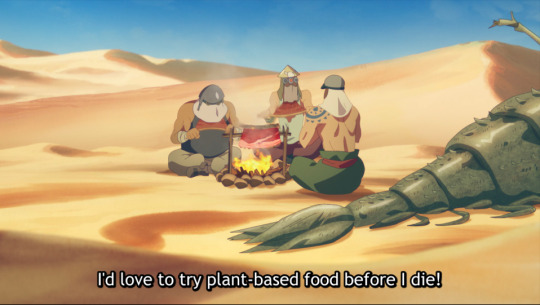
I’m also wondering how worms have muscles, but maybe we can go with alien worm biology hand waving explanation.
While enjoying their red worm meat, they spot a single individual walking alone in the desert carrying a cross, stating he’s well dressed for his own funeral and even has his own tombstone.
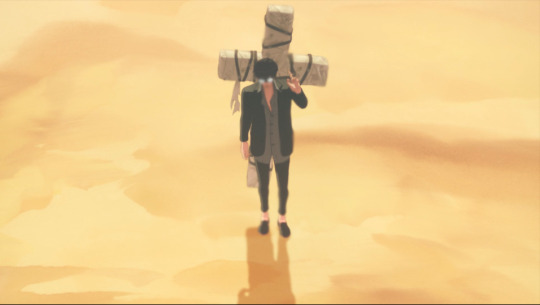
This is our introduction to Nicholas D. Wolfwood, the previously characterized wandering priest/clergyman who also works as a hired gun [anime] or religiously associated and trained assassin [manga].
The intro scene ends with a hot and sweaty looking Wolfwood. I will say, they worked hard to get a nice reflection in his sunglasses and he does sport a little of his trademark stubble, but he does look a lot cleaner.
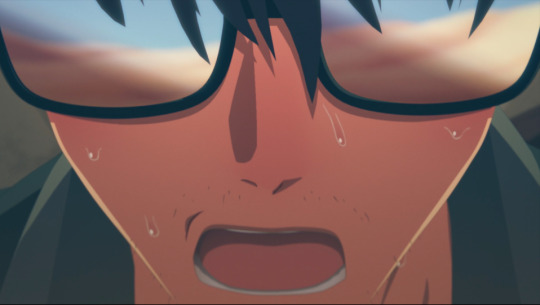
After the OP, the action returns to Meryl and Roberto listening to the news as Vash sleeps in the back of their land rover like vehicle. Vash has been blamed for the destruction of Jeneora Rock and apparently hasn’t eaten since yesterday as Roberto offers his uneaten sandwich to Meryl.
Roberto gets to comment that only god knows why Vash is acting like Vash since young and inexperienced Meryl is expecting him both to eat more yet, struggle with sleeping due to his feelings of guilt that they are both aware of.
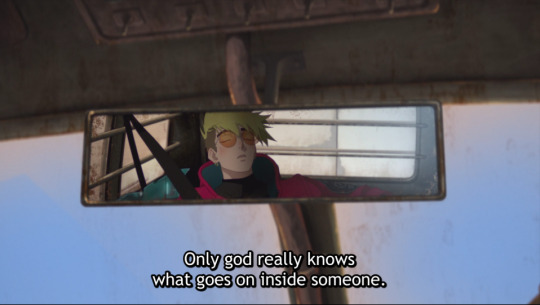
It really seems that Roberto is our info dump, make sure you understand our intent with our limited actions of what we decide to animate for our characters. Since the fact that Vash hasn’t eaten shows that he’s lost his motivation to live/ is feeling super depressed etc etc. has to be told to us by Roberto only with Meryl looking sadly at him.
Meryl then manages to almost drive right into Wolfwood and with Roberto’s help, she only nails him with the satellite trailer instead of hitting him head on. This scene is very slapstick and seems oddly out of place since Stampede has been taking itself very seriously the entire time unlike the original anime or manga.

Meryl rushes to the nearest gas er - recharge station to save the strange man she just almost killed. We see at least a nod to the original design of the plants with the light bulb station sign and a covered arch for parked vehicles.

As the group rushes in, they find the station owners shot and killed, likely looking like a station robbery. There is a noise that allows Vash to find a child hiding in a locker who looks shocked, unable to speak. At the same time, the injured man, seems to be quickly recovering able to add color commentary.

He takes the lead on some sort of ceremony for the remembrance of the dead, having taken a bottle of water from the station, sipping it before tossing some on the graves and attempting to do a poor ceremony.

It starts out passable but then quickly fails catching Meryl’s attention calling his possible job into question. She asks him if he is a priest using the term 牧師 bokushi. Interestingly, the original anime’s translation chose to use priest while the more literal translation is pastor/clergyman/reverend/minister. Though the bus driver does call him a preacher at one point.
In this version he clearly states he’s not a priest but an undertaker.

Stampede uses the term 葬儀屋, sougi-ya, which translates to funeral home or can also describe an undertaker = funeral director. Therefore, this is the second shift in a main character’s job in this version and will change aspects of his character by default, just like how it has changed Meryl’s in these first four episodes.
This is a good time to pause and compare Wolfwood’s introduction in Trigun and Trigun Maximum. It will help frame how the rest of this episode plays out.
In the anime, Wolfwood doesn’t appear until episode 9, Murder Machine after Vash’s battle against Brilliant Dynamite Neon on the sandsteamer. A glint of light catches Vash’s eye and they find a man collapsed and leaning against a cross in the desert.
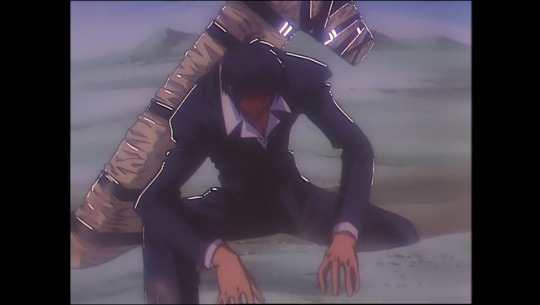
After the bus driver pokes him commenting he’s a well put together dead man, he pops up and stutters that he’s been saved! Showing that he’s got a sort of silly side.
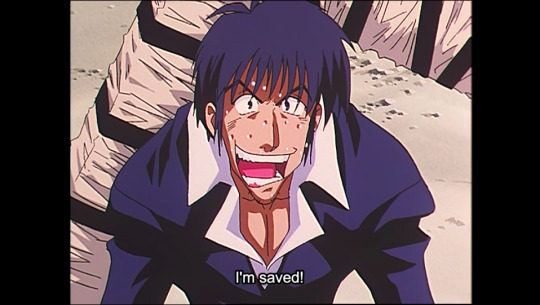
After leaning that it was neither Milly or Meryl who saved him and introducing himself as a priest, he thanks Vash after he’d drank all of his water. Vash is not pleased with this strange priest having consumed all of his water and this leads to the infamous giant introduction of Vash’s made up name which is blown by Milly blurting out he’s Vash the Stampede. Once Wolfwood’s shock calms down he offers his hand to Vash and introduces himself as Wolfwood, at his service.
Of course he also can’t help but mention that if he killed Vash he’d get the $$60 billion reward and Vash would prefer he not point this out in public.
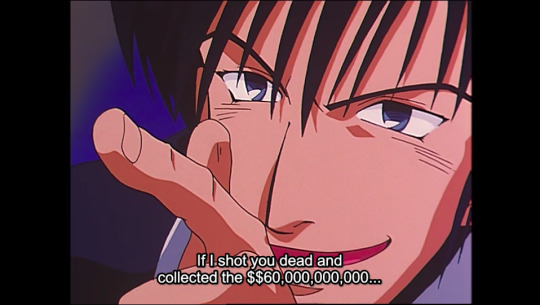
The entire introduction of Wolfwood is playful, you get the feeling that he’s a sort of prankster and has a good sense of humor though it has a dark and sarcastic undertone.
The manga is quite similar as Wolfwood introduces himself almost immediately as well. Again, Wolfwood is shocked that this weird guy is the infamous criminal and is prevented from blurting it out to the entire bus. I love how blunt Wolfwood is with his comment that ‘everyone’s damn dumb’.
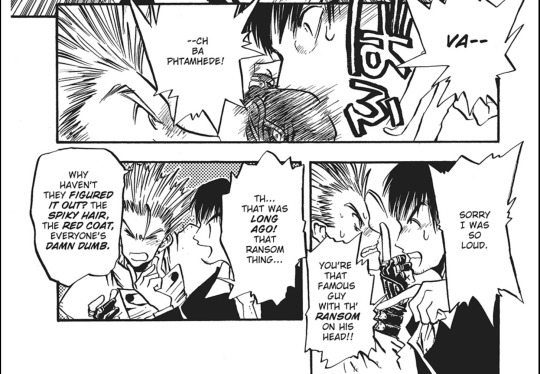
And he again introduces himself to Vash, also offering his services as well.
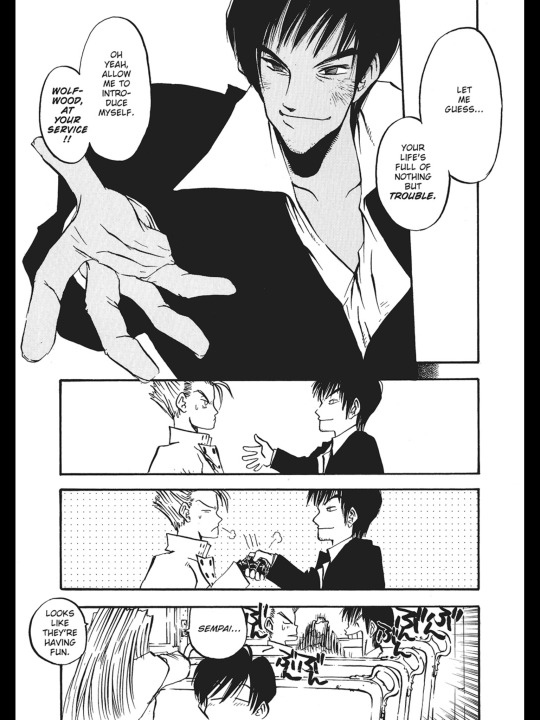
Either way, both of these introductions show how playful of a character Wolfwood can be at times and how he’s portrayed as a friendly guy and very approachable - which makes sense if you are a religious official (or traveling under the guise of one). Plus, the anime and manga both highlight that he was stranded in the desert due to his motorcycle breaking down forcing him to walk instead. This forced him to carry his cross which is both literal and metaphorical for his character arc.
In Stampede, Vash feels a bit awkward as Meryl and the unnamed undertaker argue while the putative orphaned child looks shell shocked. He walks over to the child and pops a lollipop in his mouth before offering another one to the kid. This allows for him to have a small inspirational monologue to the child.

He states outright that he’s an orphan and that - No matter how heavy the cross that you carry, you still deserve to eat. That you still deserve to laugh.
This sounds a bit like Wolfwood, a way of trying to connect with someone else. After the kid silently looks thoughtful, he returns to give his bill to Vash for $$20,000 which causes Meryl to have another meltdown about his rip off of services. Which with that abrupt change again makes me groan about the the awkward pacing and oddly placed slapstick style humor with his bill.
Roberto calls him out on not only his criminally high cost bill for services, but also notes that for being hit by a car he’s looking pretty good. His reply is that he’s tough. And that it’s his saving grace.
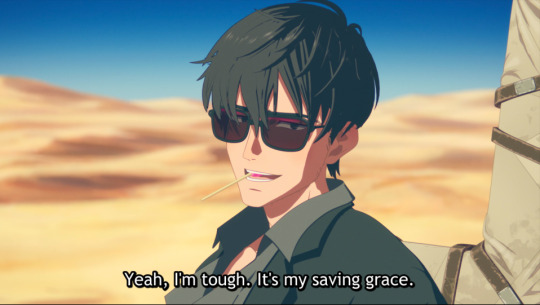
And with that suspicious look from Roberto, we hear a weird high pitched whine and the ground begins to rumble as the entire group is eaten by a giant sandworm, charging station and all! The next time we get a close up on Wolfwood he’s got a crumpled cigarette instead of the pink lollipop. This is a point were the story boarding continuity seems a bit off. We went from him having a sucker, to likely losing it as they slid down into the worm but then the link to the cigarette is missing. When did he pull it out? Why now? If they wanted to give the effect of him being level headed and cool, we would have seen him pull a cigarette out of his jacket pocket, place it in his mouth before casually lighting it. That’s how you establish a cool smoker look. Instead, he’s got a almost burnt down cigarette which does not look cool and collected. He just looks annoyed.

After their fall into the depths of the belly of the giant worm where the silent child continues to act odd. We see everyone sliding into the worm which is fine and we get to have Roberto info dump more about how worms are sort of collective organisms that have electrons to communicate with each other.
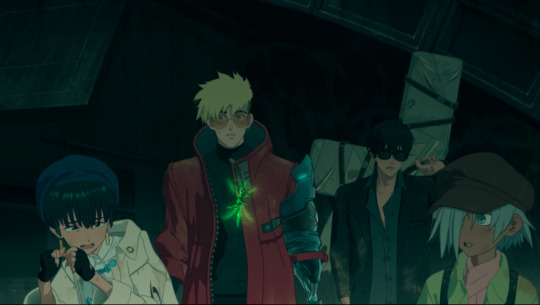
The little baby worm glows indicating that it associates with giant mama worm, hence all the little baby worms can hang out inside it unharmed. Silent child is excited by the glowing worm and dashes off!
Vash of course wants to save the child and with time being of the essence the nameless undertaker tells them to split up and called Vash とんがり tongari which is needle-noggin’ in the anime translation and spiky in the manga. I always thought the anime choice of needle-noggin’ was a clutch translation decision, really getting at the teasing intent of the nickname. With spiky hair and the fact that Vash is oblivious to things from time to time. It is pretty early for the tongari nickname to be dropped - that’s a sort of post 2 year time skip nickname.
He proceeds to assign nicknames to everyone else as well, Meryl is little missy and Roberto is uncle downer. Vash is surprised by the nickname - though I am too Vash! As he’s not as spiky with his more ruffled hair. Meryl is upset and just wants a man to call her by her name and Roberto doesn’t even argue with his. Meryl you are 100% valid, no one on the planet wants to respect you.

Though in the original he does always have nicknames for others but more of calling the insurance little sisters and variants of that instead which sort of works . . . but he isn’t particularly rude about it in the originals.

We finally see that Roberto is indeed armed with a small pistol that he loads before the split up. Keeping with Meryl’s book smarts slowly becoming more street smarts, she’s the one who points out this entire plan is a terrible idea and they should have stuck together for safety.

She’s absolutely right and finds the missing child but clearly is attacked by something. Eventually, the three men all end up meeting at the same location. Is it there they started? Or did they exit the four worm tunnels? It looks a little unclear with the vague background but I’m reading that they returned to the start where Wolfwood is chain smoking away. Likely, he never even went into the tunnel with all the cigarette butts around his feet.
Vash indicates that they can save both of them while the undertaker mocks him for his self-sacrifice and need to rescue them, calling him odd. He then grabs one of the glowing baby worms and bites into it, eating it almost whole spitting out only a small part of it. WTF is this supposed to mean? It just seems odd - I know the set up is that worms are a good source of protein, but did he need to eat one raw? What does this do for his character establishment? Will eat anyone to survive?
Due to him eating the worm, it causes Roberto to both tell Vash that this undertaker might be one of the people who can control worms to kill others. Roberto approaches him with his small derringer wanting to know what is the deal with the giant cross. He knows it isn’t what it appears and wants an answer from the suspicious man with them.
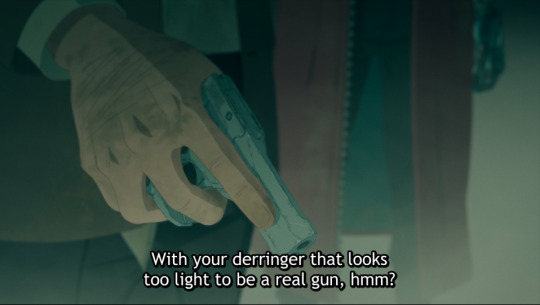
Of course the undertaker deflects this comment stating if he’d want to kill him, he wouldn’t be trapped there with them. The conversation also allows for Roberto to info dump that there are people who can control worms but his theory is off since it seems that the suspicious undertaker is trapped with them.
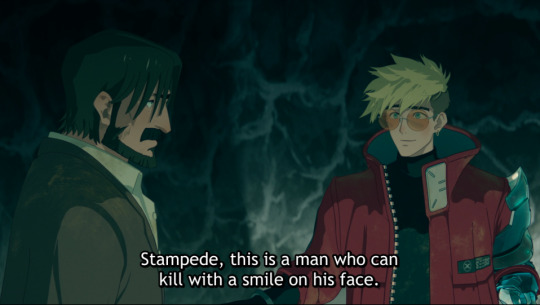
This doesn’t allow Roberto to relax and he is clear that the statement ‘could kill with smile’ but of course Vash denies this based on his eyes. We only get a vague line of ‘You really mess with me.’ which would have been a line intended for Milly in the anime; in this case for Vash and Vash uses this as his rationale that he won’t hurt them. Vash’s own behavior messes with the mystery man - he won’t hurt them!! There seems to be some sort of emotional ‘something’ to go along with the statement of Vash ‘really messing with him’ but it doesn’t linger for long because Roberto is now missing.
The duo proceed to wander around lost and Vash maintains hope while his downer companion tries everything to get him to give up, they were already eaten and digested, they are lost, they should save themselves. They proceed to be sneezed out of the worm (these sandworms apparently have animal based biology with nostrils) which has another slapstick moment of them being flung back out into the desert. Vash tells Wolfwood to run who argues that they should both run, but both get re-eaten. Since Vash doesn’t run and neither does Wolfwood.
They find the child who runs to Vash and hugs them as he reassures them it will be okay. But he’s called out for being careless and let someone out of his sight all the time. Of course Vash replies that he hasn’t been shot by the morbid man. Yeah, that’s a great rationale there Vash for trusting a man who still hasn’t told you his name!
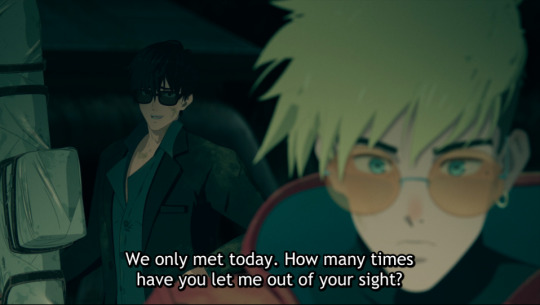
The kid then runs away and Vash figures out that they are the one controlling the worms with a high pitched sound leading us to the reveal of our next Gung-ho Gun. The inside of the worm then becomes digestive/active with saliva/liquid and Vash just yells for Meryl and Roberto to be given back. Dude! You have a gun. We know you are a pacifist but you can still use your gun! Where is your brain? Is it on vacation? Did you leave it in Jeneora Rock? In Vash’s moment of whatever, he begins to get sucked into the stomach of the worm and just stands there.
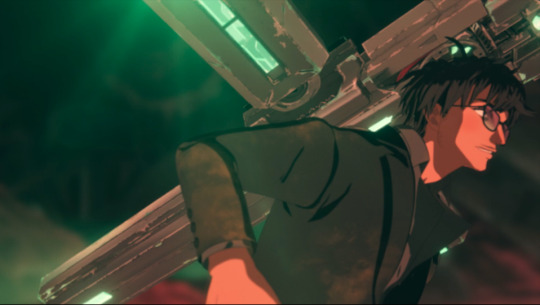
It takes Wolfwood doing the big reveal of his large Punisher in what I’d say is an overly long, drawn out sequence to reveal it - is a giant gun! Wow. Even if you’d never seen Trigun before, you could guess it is some sort of giant weapon. Was that really necessary Studio Orange? No, but you think it looks cool. You gotta animate it in all the angles.
He’s able to shoot around Vash’s feet allowing him to move and then blows a hole in the side of the worm. Our worm whisperer escapes out the side of the worm and wishes them good luck on surviving.
Now, I’ve already made it clear that I liked the slow style storytelling of the original anime and even in the manga - Wolfwood will not show what his Punisher can do - until Trigun Maximum after the 2 year time skip. Even though he’s revealed to be a Gung-ho Gun early on, he doesn’t show what his Punisher is capable of - just uses it as a blunt object. We also learn that Wolfwood’s actions are those of a trapped man and not his choice, but something he can’t get out of. The Punisher is how he’s recognized as ‘Chapel’ by Legato though Wolfwood never verbally confirms this at the Jeneora Rock Church.
But with Stampede, we don’t need any of that delay - we are going to show you how badass his Punisher is now, which can apparently create a laser beam cannon that literally slices the entire worm open and blood? haemolynth? explodes out into the desert. Wolfwood clearly has leveled up in his weapons.
We jump to a scene of the three random dudes along a campfire with them eating some of the fresh worm meat. Wolfwood teases Meryl trying to get her to eat the worm meat while Roberto points out that a man with a giant cross machine gun is pretty damn suspicious and Vash is like ‘he’s fine, he hasn’t hurt us, he helped us.’

When Vash approaches, Meryl and Wolfwood are still arguing with each other about the worm meat.
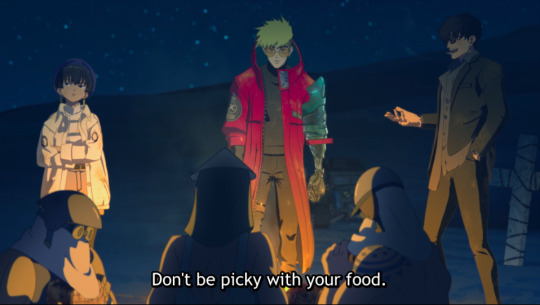
Finally, around the campfire, Vash sits down and eats some worm meat, quoting Wolfwood that he still has a right to survive and eat. Wow, deep - and Meryl is excited that sad boi is eating - he’s not going to be depressed all the time! This is also finally when Nicholas D. Wolfwood introduces himself to Vash the Stampede and they shake hands. It took the entire episode for him to introduce himself!
Wolfwood then invites himself into their crew telling them that they should get going - to where exactly sir undertaker? He continues to tease Meryl and get do get a good side profile and finally one of his cheesy smiles.
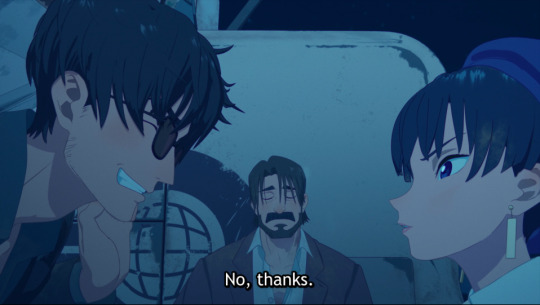
Then they all go to sleep, with Vash on top of the car to show Wolfwood chain smoking on the roof of the charging station. It then reveals that he was working with Zazie the Beast who tells him that killing his ‘friends’ is his skill and that he couldn’t care less about human lives.

He only glances slightly oddly for a moment before replying he does the job that he has to do. So, even though we have a fast reveal of Wolfwood as a Gung-ho Gun like in the manga, we don’t get his additional monologue that none of this is by choice.
The last scene returns to the place where Knives is collecting the plants and the Doctor is mentioning how Vash is the most human individual, which is why he can’t reach his full gate potential and this is why he’s not able to do whatever Knives wants him to.
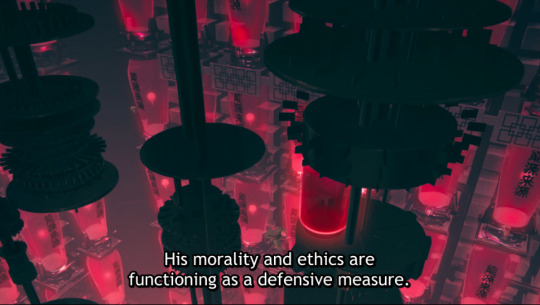
Grey the Ninelines is still in the background along with the small blonde girl - not Zazie. Is the small girl also a plant? Tessla? Are they on Knives’ ark ship?
Thus the episode ends with a sort of plot from Knives to push Vash into an extreme corner.
Main points and themes from this episode
1.) Story boarding and flow are still weak. It is still difficult to follow things at this point. Actions and transitions aren’t quite fluid and transitions are choppy. I already highlighted how Wolfwood goes from a lollipop, to falling and then having a cigarette already in his mouth but we never see it happen. There are too many blink and you miss it moments and orientation is perhaps supposed to be frantic. Based on the current pacing if we are to get more of the Gung-ho Guns including Livio, are we looking at a 12-13 episode complete series? Maybe - it would explain the action non-stop pacing.
Along with this point is the writing continuing to be average at best. This is a sci fi story where all the characters are checking particular boxes. I was almost expecting Wolfwood to ask Vash ‘Whose side are you on?’ but we didn’t get that, just him being a morbid, rude, jerk. I think the male character default in Stampede is unless you are Vash, you are a jerk. Roberto is now slightly less of jerk, so Wolfwood is the new jerk.
Does the CGI look pretty? Yes, yes, it does. As my meta nerd friend Merdopseudo put it:
In fact, "Trigun Stampede", more than an adaptation of a manga in anime, it is a demo to promote Studio Orange and its 3D.
And thus spoke the Merdo! Is this a snazzy series with generic character to get as many eyeballs as possible? Looks like it. Is it really sourcing the original material - eh, not the characterization, nor the original themes. We like to invent all sorts of terms and we’ve decided that this is an example of ‘mainstreamification’ taking a series that was modestly successful in Japan and more of a cult hit outside due to its quirky nature. Meryl is now your cute little waifu instead of being an experience insurance adjuster with her junior partner Milly.
This then leads into our characters . . .
2.) Current status of the main cast, now fully assembled per the promotional poster!
i.) Vash - Was pretty lame in this episode, his sad boi trend continues as he is so depressed from Knives most recent actions he won’t eat a sandwich and tries to sleep in the back of the car. He is considerate of Zazie when he thinks she’s a victim of a robbery while Meryl and Wolfwood argue, but puts a lot of faith and trust in a man who is suspicious as all hell based on what he sees in his eyes - through his sunglasses? Which just like Vash, Wolfwood wears his glasses all the time.
Additionally, Vash is rather useless the entire episode, again chooses to plead with Zazie to release his friends, get sucked into the stomach of the worm, unable to move and all this stuff happens and he never even thinks to draw his gun? Look, he may be a technical pacifist, but Vash knows if he shoots the worm with a bullet or two release his feet, the worm is not gonna die. Yet, he never uses his gun at all.
Are we to interpret this as Vash being ‘frozen’ and unable to act? Is this why he needs Wolfwood to do all the work for him? Where is his creative brain coming up with solutions? Why is he so helpless? Does this mean that Wolfwood inspired him to regain his confidence that he lost in episode 3 when he quotes Wolfwood’s words to Zazie? By eating?
Crisis averted - Vash has decided to live by Wolfwood’s deep words (which I’ll get to in a bit).
ii.) Meryl - or Can I just get some respect on this planet? Meryl continues to struggle in a male dominated group and has bickered with Roberto, then Vash and now, Wolfwood throughout the episode. She still has to be assisted/rescued etc but at least realized that Wolfwood’s plan was reckless and dangerous - but told no one but herself crawling through the wormtube. She’s intelligent but lacks agency and authority.
She also gets a lot of scenes bickering with Wolfwood and he gets a bit friendly with her trying to force feed her the worm steak? flank? She doesn’t look thrilled and they continue to argue until Vash sits down and eats and she is happy that Vash isn’t refusing to eat.

Without Milly Thompson as a potential romantic interest like in the original anime, are we to see Meryl x Wolfwood as a possibility? It would explain why they keep getting into each other’s faces.
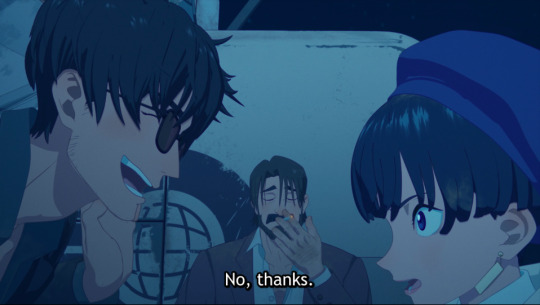
If this is the case, I’m not so keen on it, though Wolfwood in this episode is rather rude and morbid making him not very friendly or attractive. Please don’t go this direction Studio Orange if you are thinking about it.
iii.) Roberto - Our old man info dump. Yep, now with a derringer to match the promotional poster. You need to know more information about this planet and organizations - he’s got it. You need to know how to read a scene or interpret something? He’ll tell you.
I’m sorry Roberto but you are not Milly and we shouldn’t hold that against you. But really, you don’t add much to the plot. At least you didn’t take a single drink all episode, but still haven’t fixed your shirt these past few days.
He doesn’t trust anyone, or organization but he’s just chillin’. Why? What’s your deal man? Or are you just there to have four people in the main cast?
iv.) Wolfwood - Studio Orange what have you done to my man? I gotta be dramatic when it comes to Wolfwood. This is a case where a very nuanced character has been simplified to a rude guy who has no friends and will do his ‘job’.
I don’t even want to dwell too much on his now generic Tokyo hipster design, they shrank his nose and made him have a fair skin tone. Also, why does he also have an untucked dress shirt?
I have more of an issue with who and what he does based on this episode. First, is the change in his occupation when he is traveling around meeting others. In Stampede, Meryl asks him if he’s a priest and he says he’s an undertaker. This is a change from the anime and manga where he originally said boukushi = priest/clergyman but always translated as priest in both; while he’s now, a sougiya or undertaker/funeral director. Hahaha, so funny Studio Orange, a hired gun is an undertaker because he makes people dead. lols.
The change from priest makes a huge shift in how he acts. In this episode alone, Wolfwood gives Vash shit for being ‘self-sacrificing’ and mocks him about it while they are in the worm trying to rescue others.
Stampede Wolfwood is not a nice person nor willing to help others because it is the right thing to do.
In contrast both the manga and anime have Wolfwood introduce himself as a priest and later we see him trying to strike a deal with the bus driver as he’s short the full bus fare. He states if he gives up any more money, he’ll starve and the man allows for him to ride for $$80 instead of $$100 (which to be fair, he picked him up midway). This then gives Vash a reason to ask him how he makes money as a priest and why he needs money to help support orphans associated with his church. All of this makes sense, most people who take religious vows/occupations are not flush with cash and Wolfwood is no exception. But what happens next is how Wolfwood demonstrates self-sacrifice towards others.
In the manga young children beg him for assistance and he of course gives all he can dividing it between himself and the children equally, even though he’s an adult. We know he’s not lying, we just saw him haggling with the bus driver.

In the anime, we have a similar scene where he offers two of his three meal blocks to hungry children as well.

Their mother thanks him and the children understand the importance of their gifts even stating they will not waste a crumb. They respect his sacrifice for them. These two scenes show us that Wolfwood very much cares for humanity and innocents who need help from adults. Does he also understand that there is evil in the world? Yes, but it doesn’t make him isolate himself from others and helps in anyway he can.
Afterwards, he walks back to see Vash beaming with a soft genuine smile, which prompts him to state that he was worried that Vash couldn’t smile - you know really smile - not fake cover the empty pain sort of smile. These scenes alone make sense why Wolfwood makes sense to be traveling as a priest/hired gun as in the anime or a religious assassin in the manga. In both cases, we know that despite his failings, he has the underpinnings of religious beliefs and actions. His faith guides his morals and drives the conflict inside himself which eats at him even though he eventually finds peace and acceptance in both versions.
In the anime episode 9-11 allows for ample Wolfwood character development with the rest of the group as he reveals his precision shooting skills to Vash despite lying in Murder Machine - but Vash also states that Wolfwood’s prayer worked and God saved them. Episode 10 Quick Draw has him twisting Vash’s arm into a contest to help out a woman and her son but also gets into the mix, revealing that he’s got multiple guns in addition to his fine marksmanship. Lastly, 11 Escape from Pain has him getting into a philosophical argument with Julius, Milly, and Vash before departing the group. The scene where pulls out his pistol and holds it to his temple to test Julius and Moore.
Murder Machine was an episode where an unarmed Wolfwood jumped into action with Vash to save a single child! This is a man who understands self-sacrifice. We also get his entire uncool dodging of laser beams here:
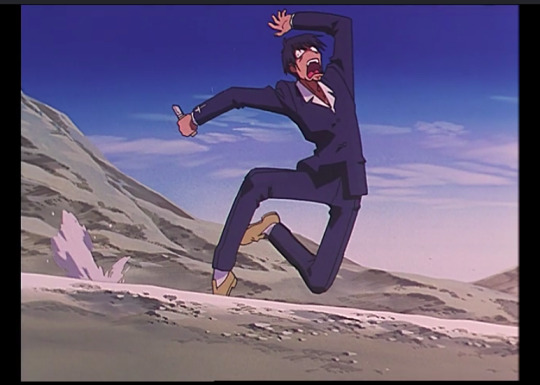
If we turn back to episode 4 of Stampede - Hungry we can’t even take his interaction with Zazie seriously nor compare it to what he offered previously unknown children. He eats a lollipop for himself and offers the other to Zazie because she might be hungry? We know he gave Vash and Meryl a crazy invoice but nothing says he’s on a budget, nor is giving up a single piece of candy self-sacrificing. Did you get the point Studio Orange? No, because you decided that he’s not that type of character anymore.
Who is this character in Stampede? Not one I recognize from the anime or manga that’s for certain. He’s rude, has his gun Punisher which is now vastly more powerful than previously and is not friendly at all! We know he’s got a job to do for Knives but he’s not really selling himself as a great traveling companion or friend for Vash.
I think that Wolfwood is such a popular character due to his humanity that he displayed in the original series; how he has an internal conflict struggling to navigate life on a shit planet either as a gun for hire in the anime or trained assassin in the manga. He drinks, gambles, smokes and is willing to kill others if they will hurt innocents. Yet, he strives to do his best as indicated by his inner thoughts while playing chess against the random guy in episode 11. He realized it was dumb to bet his entire fare on this chess game and thinks about head butting the man and making a run for it - only to correct himself by reminding him to think of his profession as a priest.
He is also a jackpot character for fans - he’s a priest and a gunman who has principles yet also sins - what’s not to love about that set up? As Merdo put it, even as an atheist, you can’t help but love a character like him. Why Studio Orange passed on this aspect of his character and the leverage of such a trope baffles both of us.
Come on, you missed this golden line when the bus driver and two other guys toss his ‘luggage’ down to him. The bus driver remarks that the damn thing is heavy and to what Wolfwood replies:
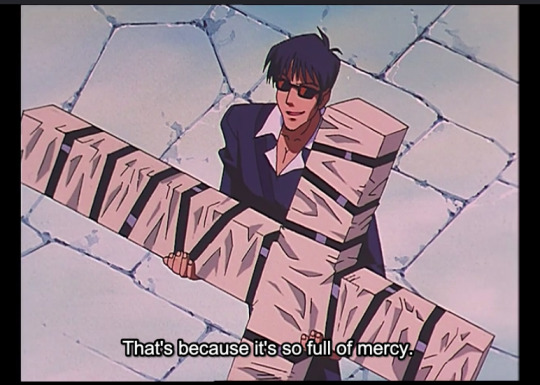
Which is the best clever joke that it is full of mercy, if you ever met it, you will have a swift and merciful death.
Or lastly, his words of blessing when he departs from the group which is totally in line with him being religiously affiliated.
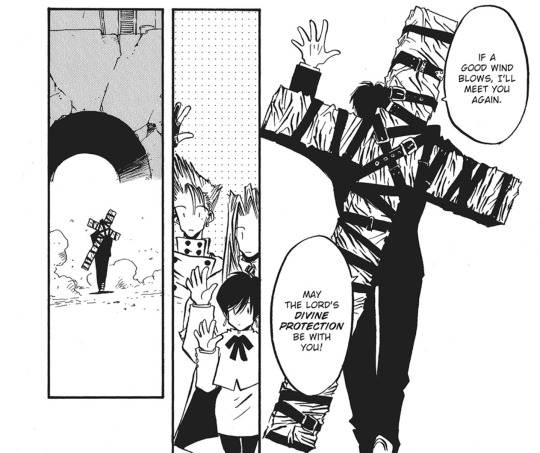
3.) Themes for this week. I really don’t have anything obvious. Eat to live? Life sucks sometimes but if you don’t eat you die? Not very motivational all in all. With Wolfwood no longer a priest (or under the guise of being one), the line of a heavy cross to bear rings hollow. BTW, Knives is still really evil.
#trigun stampede#trigun anime#trigun maximum#trigun manga#vash the stampede#nicholas d. wolfwood#meryl stryfe#roberto deniro#zazie the beast#anime meta
39 notes
·
View notes
Text
fragile dudebros got So Mad about Menou killing that guy in the first episode but he actually served as a pretty fantastic narrative foil to Akari. This guy got isekaid and immediately tried to be a hero and thought he was strong and invincible because of his pure concept. And then, despite his arrogance and ambition, he was immediately killed
Akari, on the other hand, seems ditzy and overly trusting at first. Literally all she wants is to spend time with Menou, who she loves seemingly blindly. Yet, Akari is unkillable and powerful enough to change the fabric of the world. Makes for an interesting commentary on what it takes to survive in that world
#in related news virgin road owns me#the executioner and her way of life#shokei shoujo no virgin road#shokei anime#menou#akari#yuri#anime#anime meta
75 notes
·
View notes
Text
Me: *having a good day*
My brain: Neon Genesis Evangelion, Devilman Crybaby and Part 1 of Chainsaw man all are parallels of each other. Now, start drawing conclusions from all three shows and link them.
#neon genesis evangelion#devilman crybaby#chainsaw man#anime meta#i did not need this today#sits on the ground and thinks about my life deeply#my brain is a whole nother person
21 notes
·
View notes
Text
Carole & Tuesday is so ridiculous when you think about it for more than 2 seconds because they could have just written your regular coming of age shojo anime about two girls who write music together BUT INSTEAD they chose to have it set in a half dystopian future where humanity has colonized Mars and most jobs are done by AI, and have it focus on immigrant rights and racism and motherhood and how living on Mars transes your gender it's so hilarious
For real though. There's obviously a lot of issues with C&T because it's an anime and let's face it there's a lot of issues with the medium as a whole, but for an anime it's outstandingly good.
For starters, there are tons of actual canonically openly confirmed LGBTQ+ characters, which is amazing. Most notably, that includes a disabled intersex character who uses he/him pronouns — the fact that he uses a wheelchair is never addressed and none of the characters seem uncomfortable about it, which is a huge deal for an anime.
The ex wife of one of the main characters is getting married to a woman and although it's never said directly that she is a lesbian and not, say, bi or pan, it's implied that her sexuality is the reason they split up. And guess what? There is no animosity, no spite, even no doubt. They are actually friends in fact. More of this in anime please!
And the thing that really got me was there are people of colour in this anime! Two of the main three are people of colour actually — one of them, Carole, is a Black girl and seeing her with her hair down or tied up was a shocking experience for me because the only way I've seen Black people portrayed in anime before was identical as the white characters except with a darker skin hue, which almost always looked... off. At least to me. But there are multiple Black characters in this anime and while there are some issues with it, their character models are actually very natural looking. They all have naturally Black hairstyles, including our main girl Carole with her gorgeous dreadlocks. It was like a breath of fresh air to see this.
The first season is good, but rather average in my opinion. It's a lot of the coming-of-age stuff and generally just the girls working on their music together. The songs are incredible for the most part, and Angela's subplot at least is interesting, even if Carole and Tuesday's storyline gets stale every now and again. The second season, however, is a far cry from the softness of the first. I don't think the team behind C&T had planned this show would go this way, because the sudden turn for the political does seem a bit out of the blue.
The second season is... hoo. Where do I start. First of all there's this whole subplot of the presidential election (because it stands to reason that Mars, an entire planet, would obviously have a single president governing it). One of the candidates is planning to deport all illegal immigrants (who coincidentally are mostly people of colour, at least to the extent it's shown in the anime) and send them back to Earth. And of course Carole is an illegal immigrant and of course the presidential candidate is Tuesday's mother. As tensions rise, Black musicians are arrested because of the message of their songs (especially visible in the subplot of the rapper Ezekiel who's released a very in-your-face fuck-the-government music video) and I guess this was... okay? I mean I see what they were trying to do here, but if you're watching the whole anime in one sitting it does feel like all of this came out of nowhere. It was handled kind of okay? I don't know. It wasn't great.
Angela's storyline is where the second season shines. We get to deal with alienation, losing a parent first metaphorically then literally, questioning your entire world and existence, substance abuse which eventually leads to hospitalisation from overdosing? All of it is absolutely perfect. You can feel Angela's despair when she realises she has no support net and the tension when she reaches out to the one person she can trust is palpable. Oh. Uh spoiler alert I guess? Anyway. This season also tries to deal with what fame does to you and shows a person who's very broken after losing everything including her ability to sing, which I guess was supposed to be about trauma and/or PTSD, but it was very rushed.
The main theme of the second season remains motherhood and what it means to be a mother. All three of the main characters have Issues™ on this front. Angela's mother acts more like an agent than a loving parent and when Angela finds out she was actually adopted, her downward spiral starts. Tuesday's mother is shown to be distant to both of her children and more focused on her political campaign than on parenting them. Carole is an orphan who never met her mother, but she thinks of her home and where she comes from as the things that shaped her into the person she is and therefore are her actual "mother". Which. Yeah I guess I can tell what they were going for? It's phrased in a weird way.
Yeah. I think the best way to sum up the second season is that it tried. It tried to do a lot of things — some of which admittedly worked very well, some of which... not so much. All in all, it's still very enjoyable, more so than the first, and the soundtrack is still absolutely amazing.
Honestly the biggest issue with this anime I had are the moments of fatphobia popping up every now and then. It's not as bad as in most anime, don't get me wrong, but I still winced a bit when the girls were shown a photo of a younger Gus which revealed he used to be thin and immediately remark that he used to be so good looking. Angela's mother is also a fat person and seeing how she's portrayed as something of a minor antagonist, that's also kind of... not great. All in all though, there is variety in the body shapes of these characters, which once again is a wonder in the world of anime.
And for last I've left the thing that I can't tell for sure if it's a good thing or not. The relationship between Carole and Tuesday is left completely ambiguous. On the one hand, as an aroace person, great! None of the main three characters get a love interest during this story, or even at the very end, and that's awesome! They have their own little found family and no one is dating anyone! On the other hand, as a queer person, let the girls kiss already! As much as I love to interpret their relationship as a platonic or maybe queerplatonic one, there are also moments that have no heterosexual explanation. I don't think they were baiting us because there's already tons of LGBT characters in this show, but the exact nature of the relationship between Carole and Tuesday is never actually specified. Good or not, that's how it is.
And here it is. My little tumblr post turned review because why would I ever plan a thing like this. Anyway, what I wanted to say is that for all its faults, Carole & Tuesday is really a good show, and one of my go-to choices for a feel-good binge for one weekend.
15 notes
·
View notes
Text
It’s remarkable how across iterations, Tenma never tried to get his spouse and lover back by making a robot double of Hoshie. My first guess is that even at his worst and most abusive/villainous, he’d never resort to sex slavery. My second guess is that Tenma respected his spouse as an autonomous human being with her own individuality to a much greater degree than he did his kid, and that difference between his attitudes towards them continued even after they died. I’d also accept both being true at the same time.
#I want to believe writers for new adaptations just kinda. come to this understanding of tenma just by looking at him#astro boy#tetsuwan atomu#umataro tenma#hoshie tenma#astro boy meta#anime meta#fan meta#adaptations#osamu tezuka#osamu tezuka star system#anime#manga
16 notes
·
View notes
Text
The idea that anime is somehow uniquely misogynistic and pedophilic, or if it is even inherently these things, is racist. Hope that helps.
8 notes
·
View notes
Text

Expertise can't help you here.
#dungeon meshi#kabru#laios touden#falin touden#Happy Thistle Thursday once again. Have I been holding on to this comic for several weeks? Sure have!#I forgot how long it takes for Chimera Falin to come into play.#I still really love my 'better drawn' art of her - unfortunately it was several weeks too early for the anime only folks.#Slowly getting the hang of drawing Laios. I don't know why I struggle so much but I am getting...somewhere.#Meta time: God damn I love how the chimera shows off the expertise and gap between Kabru and Laios.#The truth is: they are both *right* and they are both *wrong*.#This creature is a combination of monster and human and they only have the skillset to deal with one of those.#Kabru goes for all the human vitals - but she isn't human.#Laios tries to approach her as a monster and is struck down by the humanity he sees in her.#She is something new that defies what they *both* understand about the world. And that makes her such a perfect antagonist.#The damsel was the dragon all along!#...She is really so cute though. Terrifying! But adorable. I am so excited to see the boom of fanart for her.
21K notes
·
View notes
Text
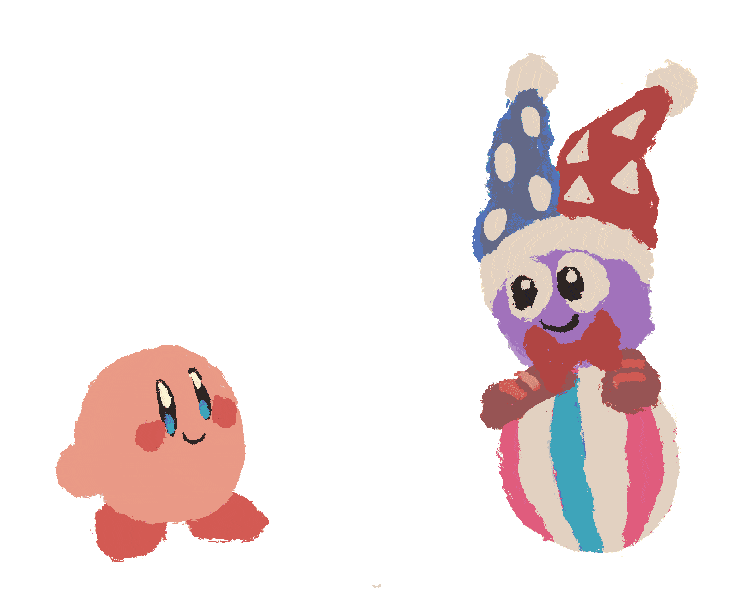
happy birthday to them all
4K notes
·
View notes